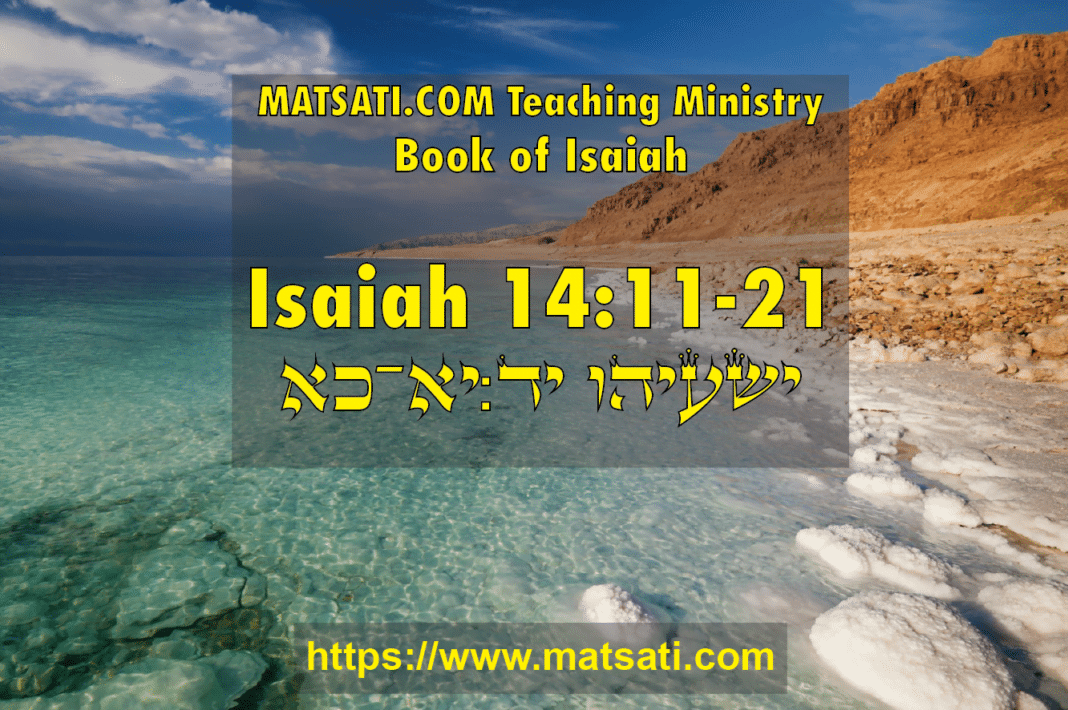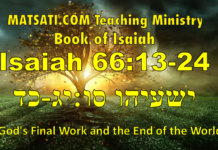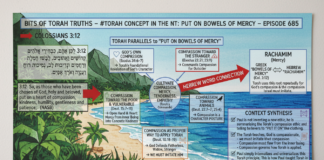Introduction to Isaiah 14:11-21
Isaiah continues in his lament speaking of the pride and arrogance as being what it is that causes this king to descend into the grave (שְׁאוֹל). We will learn that according to Isaiah 14:12 this one that is being referred to considers himself so lofty and lifted up that he would glorify himself above God in heaven. The grave is not a place of rejoicing. I have heard it said that in hell there will be partying and rejoicing with one’s peers (friends). This is very far from the truth as in the grave there is silence, and in hell there is darkness and suffering with no end to the suffering. Standing on the left may be fun in this lifetime, but in the Olam Haba (World to come) to stand on the left is to take the side of the evil one, the one who exalts himself in pride and arrogance, who walks in wickedness and unrighteousness. The left is the side of the weak, as opposed to the right who are strong by their faith in God and His Messiah! Death and Hell cling to the left and drag one down to the grave, this is a kabbalistic way of interpreting what it means to stand on the left. The grave is not a place of celebration, but one of suffering, torment, where the rotting corpse is covered in worms, decay, and corruption, all of those things that represent the antithesis of life, death, and silence forever!

ספר ישעיה פרק יד
יא הוּרַד שְׁאוֹל גְאוֹנֶךָ הֶמְיַת נְבָלֶיךָ תַּחְתֶּיךָ יֻצַּע רִמָּה וּמְכַסֶּיךָ תּוֹלֵעָה:
Isaiah 14:11 states, “Thy pomp is brought down to the grave (הוּרַד שְׁאוֹל גְאוֹנֶךָ), and the noise of thy viols: the worm is spread under thee, and the worms cover thee. (הֶמְיַת נְבָלֶיךָ תַּחְתֶּיךָ יֻצַּע רִמָּה וּמְכַסֶּיךָ תּוֹלֵעָה)” Here Isaiah states that it is pride that brings one down to the grave. The first word in Isaiah 14:11 is הוּרַד meaning “to go down, bring down, cause to fall down” written in the hofal qatal perfect third person masculine singular form. This word illustrates for us why it is very important to recognize the Hebrew verbal patterns, and this illustrates why it is so important to study the Hebrew language and for interpretation of the Scriptures. This one word illustrates how important this is when we consider what is going on in the Hebrew roots community. For example, there are some in the Hebrew roots movement who believe the proper way to pronounce Yeshua’s name is “Yahusha.” When we break this down it is the composition of two words “Yah” (יה) and “husha” (הושע). The first word יה is a circumlocution used in the psalms and elsewhere in the scriptures for the YHVH, the Name of God. The second word is the root word for salvation. So, the claim is that saying Yahusha one is saying that “God saves.” This is not exactly a correct translation of this fabricated word “Yahusha.” The word husha הושע can take one of two verbal patterns to make the sound “husha” in Hebrew. הושע needs to be either in the hof’al or pu’al verbal patterns. An example of the pu’al verbal pattern may be found in Isaiah 9:5 (9:6 English).

ספר ישעיה פרק ט
ה כִּי-יֶלֶד יֻלַּד-לָנוּ בֵּן נִתַּן-לָנוּ וַתְּהִי הַמִּשְֹרָה עַל-שִׁכְמוֹ וַיִּקְרָא שְׁמוֹ פֶּלֶא יוֹעֵץ אֵל גִּבּוֹר אֲבִי-עַד שַֹר-שָׁלוֹם:
Here Isaiah says כִּי-יֶלֶד יֻלַּד-לָנוּ בֵּן נִתַּן-לָנוּ “for unto us a child is born.” Note the Binyanim on יֶלֶד יֻלַּד both words have the same root ילד just having different verbal pattern יֶלֶד (a child) יֻלַּד (was born). Note the similarity in the verbal patterns הוּרַד (hof’al) “was brought down” and יֻלַּד (pu’al) “was born.” These verbal patterns produce the “hua” pronunciation and are the only options for making this “husha” (הושע) sound in the word “Yahusha.” So having a basic understanding of Hebrew reveals to us the meaning of “Yahusha” as meaning “God was saved” meaning that “God needed saving” because the word literally means “God was saved,” etc. This word is completely theologically in error, as God does not need saving, we are the ones who need saving. So, when someone says “Yahusha” this actually is an embarrassment on their behalf, foolishly saying something that is completely wrong theologically from the Hebrew language. The reason this occurs in the Hebrew roots community is because most do not really know, understand, or read Hebrew! So, the end result is utter embarrassment in regard to using this word! My advice would be to take this very seriously since we are talking about our savior here, and we should not walk in ignorance foolishly believing what uneducated people tell us. I encourage everyone to study the Hebrew language so one does not fall into this sort of foolishness in regard to their faith. The correct name for Jesus is ישוע “Yeshua.” There are many examples in the Tanakh where this word appears, it means “salvation.” (Isaiah 12:2-3, ב הִנֵּ֨ה אֵ֧ל יְשׁוּעָתִ֛י אֶבְטַ֖ח וְלֹ֣א אֶפְחָ֑ד כִּֽי־עָזִּ֤י וְזִמְרָת֙ יָ֣הּ יְהוָ֔ה וַֽיְהִי־לִ֖י לִֽישׁוּעָֽה׃ ג וּשְׁאַבְתֶּם־מַ֖יִם בְּשָׂשׂ֑וֹן מִמַּעַיְנֵ֖י הַיְשׁוּעָֽה׃)
The remainder of Isaiah 14:11 speaks to the grave where there is silence, darkness, and suffering where the worm never dies as Yeshua said in Mark 9:48. As we move to Isaiah 14:12-15 we learn how pride causes one to fall, even from heaven. We note that in Isaiah 14:12, there is a link to something Yeshua said in Luke 10:18 and John wrote in Revelation 12:8-9. These references connect the Fall of Satan to this verse here in Isaiah 14. John Oswalt however agrees with the broader opinion of the expositors who have written on these verses, that this does not refer to Satan but to man and his pride. It is interesting how there are many parallels throughout Isaiah 13 and 14 that speaks to the pride of man. It is also interesting how the name of the king of Babylon is explicitly left out of Isaiah’s prophecy. It was also the pride of the dragon, the evil one that led to his ultimate downfall. The parallels here actually allow for such an interpretation as connecting to Luke 10:18 and Revelation 12:8-9. John Oswalt writes that there are discoveries showing similarities in the poem being written here by Isaiah from the Canaanite myths uncovered at Ugarit. Even though there are similarities, there is no copy of Isaiah 14:12-15. When we consider the idea of man challenging God, there are a number of places throughout the Scriptures this occurs. There are two places in particular that we are reminded of one is the king of Babylon (Daniel 4:28-33), and the other is king Herod (Acts 12:21-23).

Daniel 4:28-33
4:28 All this came upon the king Nebuchadnezzar. 4:29 At the end of twelve months he walked in the palace of the kingdom of Babylon. 4:30 The king spake, and said, Is not this great Babylon, that I have built for the house of the kingdom by the might of my power, and for the honour of my majesty? 4:31 While the word was in the king’s mouth, there fell a voice from heaven, saying, O king Nebuchadnezzar, to thee it is spoken; The kingdom is departed from thee. 4:32 And they shall drive thee from men, and thy dwelling shall be with the beasts of the field: they shall make thee to eat grass as oxen, and seven times shall pass over thee, until thou know that the most High ruleth in the kingdom of men, and giveth it to whomsoever he will. 4:33 The same hour was the thing fulfilled upon Nebuchadnezzar: and he was driven from men, and did eat grass as oxen, and his body was wet with the dew of heaven, till his hairs were grown like eagles’ feathers, and his nails like birds’ claws. (KJV)

Acts 12:21-23
12:21 And upon a set day Herod, arrayed in royal apparel, sat upon his throne, and made an oration unto them. 12:22 And the people gave a shout, saying, It is the voice of a god, and not of a man. 12:23 And immediately the angel of the Lord smote him, because he gave not God the glory: and he was eaten of worms, and gave up the ghost. (KJV)
Here are two examples, the first from Daniel 4 describes the hanging gardens of Babylon. The gardens were considered one of the wonders of the ancient world. The Greek historian Herodotus described Babylon in great detail. Nebuchadnezzar built the gardens in 580 BC for his wife Amytis, daughter of the Median King Astyages. So King Nebuchadnezzar boasted of his great kingdom and the garden that he had built in Daniel 4 and the Lord God commanded that because of his pride, his kingdom will depart from him (Daniel 4:29-31) and that he would become as an animal who grazes grass in the field. The Lord God humbled the great king. It was the Lord God who gave him his powerful empire and the Lord was showing him that he can simply take it away from him through the transformation of his life to the state of an animal for a season of time. Note the mercy God had on the king, because after his trial was finished, God restored him to power, and he recognized how God had humbled him and gave God the glory. This is not the case for Herod according to Acts 12. In this written account, the people shouted praise to a man, and Herod did not give praise unto the Lord, so the angel of the Lord struck him dead and we are told he was eaten by worms and died. These events appear to occur all at the same time, the striking, the worms bursting forth so people could see, and then him dying giving up his spirit. These stories describe how men challenged God and what happened as a result. The point is to remain humble and to recognize whom it was that is the source of our blessing! The battle on this earth is between the Creator and the creatures, and these Scriptures reveal how God ultimately rules over all, and as Creator He has the right to do as He pleases. We are called to humble ourselves and bow to Him in service and worship and praise. This can be a challenge, but with God’s help, anything is possible!
ספר ישעיה פרק יד
יב אֵיךְ נָפַלְתָּ מִשָּׁמַיִם הֵילֵל בֶּן-שָׁחַר נִגְדַּעְתָּ לָאָרֶץ חוֹלֵשׁ עַל-גּוֹיִם:
Isaiah 14:12 states, “How art thou fallen from heaven, (אֵיךְ נָפַלְתָּ מִשָּׁמַיִם) O Lucifer, son of the morning! (הֵילֵל בֶּן-שָׁחַר) how art thou cut down to the ground, which didst weaken the nations! (נִגְדַּעְתָּ לָאָרֶץ חוֹלֵשׁ עַל-גּוֹיִם)” So this is the description of the one who fell from heaven, הֵילֵל בֶּן-שָׁחַר. Note that the word “Lucifer” is not in the Hebrew text and is not in the Septuagint (Greek Translation).
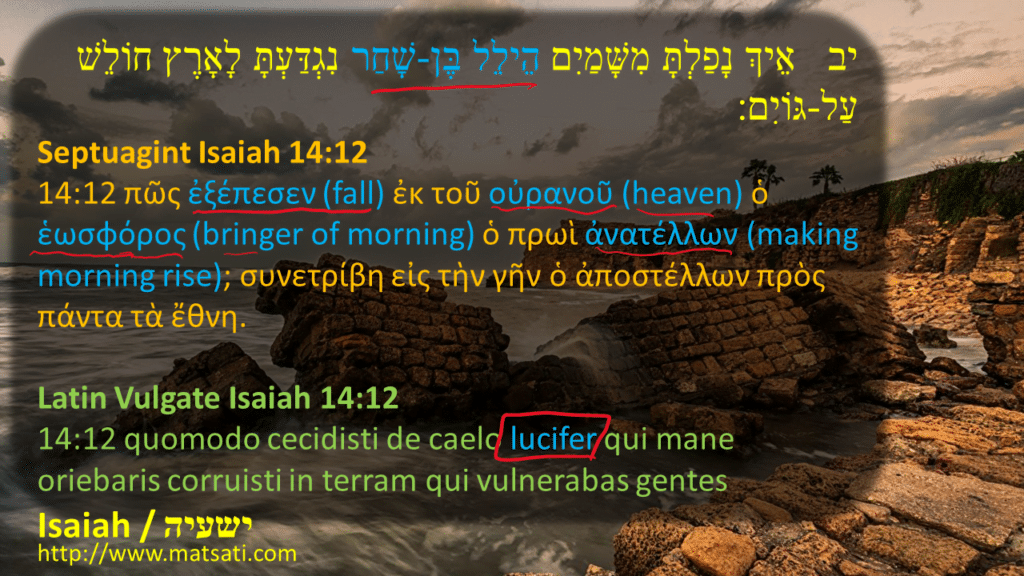
Septuagint Isaiah 14:12
14:12 πῶς ἐξέπεσεν (fall) ἐκ τοῦ οὐρανοῦ (heaven) ὁ ἑωσφόρος (bringer of morning) ὁ πρωὶ ἀνατέλλων (making morning rise); συνετρίβη εἰς τὴν γῆν ὁ ἀποστέλλων πρὸς πάντα τὰ ἔθνη.
Latin Vulgate Isaiah 14:12
14:12 quomodo cecidisti de caelo lucifer qui mane oriebaris corruisti in terram qui vulnerabas gentes
We actually get the word “Lucifer” from the Latin Vulgate. Let’s note the following reference in the NT text, Luke 10:18 and Revelation 12:8-9.
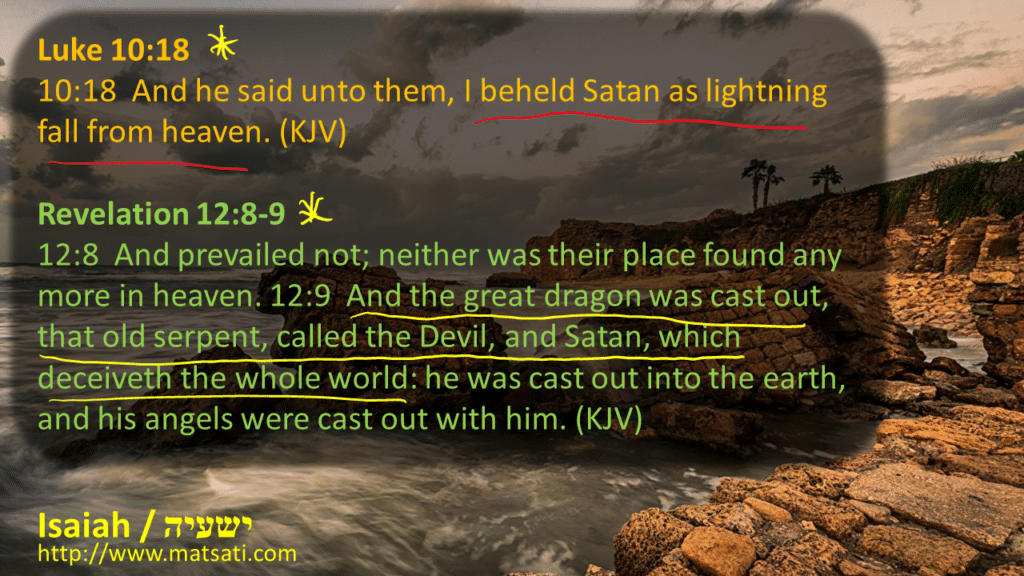
Luke 10:18
10:18 And he said unto them, I beheld Satan as lightning fall from heaven. (KJV)
Revelation 12:8-9
12:8 And prevailed not; neither was their place found any more in heaven. 12:9 And the great dragon was cast out, that old serpent, called the Devil, and Satan, which deceiveth the whole world: he was cast out into the earth, and his angels were cast out with him. (KJV)
These passages have a parallel to what we are reading in Isaiah 14:12. These passages from Luke 10:18 and Revelation 12:8-9 speak to the fall of Satan. Some commentators believe this is what is happening in the text, and was what Yeshua was referring to in Luke. John Oswalk on this verse states the following:
Day Star, Son of the Morning reflects the likelihood that hēlēl ben-šāḥar refers to the planet Venus, which never reaches the zenith before the sun rises and apparently extinguishes it. hēlēl probably comes from the root meaning “bright” and thus logically applies to the brightest star. In Canaanite mythology the god Athtar, with whom the gods attempt to replace Baal at one point, may also be the morning star. In that story, however, Athtar does not seek the position and, upon finding himself unsuited for it, voluntarily leaves it. Recent attempts to derive the Isaiah account from the Greek myth of Phaeton, in which the central figure loses control of the chariot of the sun and is struck by a thunderbolt of Zeus in order to save the earth from the sun’s fire, suffer from the evidence that the Greek myth is derived from the Near Eastern stories rather than being the precursor of them. Once again, the indications are that the prophet was not dependent upon any one story but used a number of current motifs to fit his own point. weak upon the nations is translated by AV and RSV as “who weakened the nations.” But the normal meaning of the verb is intransitive, and the parallel “cast down on the earth, weak on the nations” yields a good sense when appropriately interpreted as in NEB, “sprawling across the nations.”
John N. Oswalt, The Book of Isaiah, Chapters 1–39, The New International Commentary on the Old Testament (Grand Rapids, MI: Wm. B. Eerdmans Publishing Co., 1986), 321–322
It is interesting that the word הֵילֵל is a hapax legomenon meaning that it occurs only once in the Tanakh. So, the idea is the English translators had some difficulty figuring out what this word meant so as in the case of the KJV they chose to use the word “lucifer” from the Latin Vulgate. When we look at the Latin Vulgate, the word lucifer is treated as the “morning star” from the Hebrew text. The word lucifer was not treated as a proper name as we see going on in the English translation indicated by the capitalization of “Lucifer.” Some people get confused over this issue of the proper name and then claim that Lucifer is the morning star and Yeshua (Jesus) is also the morning star and so Lucifer = Jesus. The confusion comes from the modern translations causing confusion to readers on the identification of the morning star. The claim then that Lucifer = Jesus is a convolution of the errors being made in the English translations. We note that when we read the Latin Vulgate, the word lucifer is not a proper name but actually the latin for “morning star.” The word lucifer occurs four times in the Vulgate found in Isaiah 14:12, Job 11:17, Job 38:32, and 2 Peter 1:19. According to Job 11:17, the KJV renders the Hebrew word בקר as ‘morning’ as lucifer. (וּֽ֭מִצָּהֳרַיִם יָק֣וּם חָ֑לֶד תָּ֝עֻ֗פָה כַּבֹּ֥קֶר תִּהְיֶֽה; et quasi meridianus fulgor consurget tibi ad vesperam et cum te consumptum putaveris orieris ut lucifer) The idea of the evil on (Satan) falling from heaven being connected here to the Isaiah text does have some basis in the idea of pride leading to one’s fall. This is consistent with what we have been reading thus far in Isaiah. The word Lucifer does not provide a proof text for Satan falling from heaven, the pride of men, and even spiritual beings such as angels, will lead to one’s fall from heaven, being cast out of heaven. Note how sin does this, and what we read in the final chapters of Revelation (20-21) regarding the sinners being not allowed in heaven. These New Testament passages do seem to be alluding to Isaiah 14:12, connecting the fall of the one mentioned there with the fall of Satan. The major premise is to what Isaiah has been speaking of, pride is what leads to a fall!
ספר ישעיה פרק יד
יג וְאַתָּה אָמַרְתָּ בִלְבָבְךָ הַשָּׁמַיִם אֶעֱלֶה מִמַּעַל לְכוֹכְבֵי-אֵל אָרִים כִּסְאִי וְאֵשֵׁב בְּהַר-מוֹעֵד בְּיַרְכְּתֵי צָפוֹן: יד אֶעֱלֶה עַל-בָּמֳתֵי עָב אֶדַּמֶּה לְעֶלְיוֹן:
Isaiah 14:13 states, “For thou hast said in thine heart, I will ascend into heaven, (וְאַתָּה אָמַרְתָּ בִלְבָבְךָ הַשָּׁמַיִם אֶעֱלֶה) I will exalt my throne above the stars of God: (מִמַּעַל לְכוֹכְבֵי-אֵל אָרִים כִּסְאִי) I will sit also upon the mount of the congregation, in the sides of the north: (וְאֵשֵׁב בְּהַר-מוֹעֵד בְּיַרְכְּתֵי צָפוֹן)” Isaiah 14:14 states, “I will ascend above the heights of the clouds; (אֶעֱלֶה עַל-בָּמֳתֵי עָב) I will be like the most High. (אֶדַּמֶּה לְעֶלְיוֹן)” Isaiah 14:13-14 speak of the extent of pride in one’s life, as claiming to be exalted above the stars and even the throne of God which is above the stars. John Oswalt states that there are some similarities between these verses and the Ugaritic poems. Here God is referred to in the singular אֵל as opposed to “Elohim” in the Canaanite poem. According to the Canaanite beliefs, there was a pantheon of gods who existed under Elohim, gods such as Baal. This may lead to reasons why Israel was so easily incorporated the worship of baal and ashtaroth coupling with their belief in the God of Israel. So, the idea here is that Isaiah is making this king of Babylon to aspire to the kingship of the gods. We note that in the Tanakh, throughout 1 and 2 Samuel and 1 and 2 Kings, we read the Hebrew במות as describing the “high places” in which the people sacrificed and worshiped. These hilltops were places for sacrifices to these false gods, analogous to being as high as the heavens. Note there are some mountains (generally speaking) that are higher than the clouds providing this imagery. This statement אֶעֱלֶה עַל-בָּמֳתֵי עָב אֶדַּמֶּה לְעֶלְיוֹן “I will ascend above the heights of the clouds; I will be like the most High” speaks to these high places. The Tanakh depicts Goďs power as manifested in his stepping on the high places of the earth (Amos 4:13 and Micah 1:3).
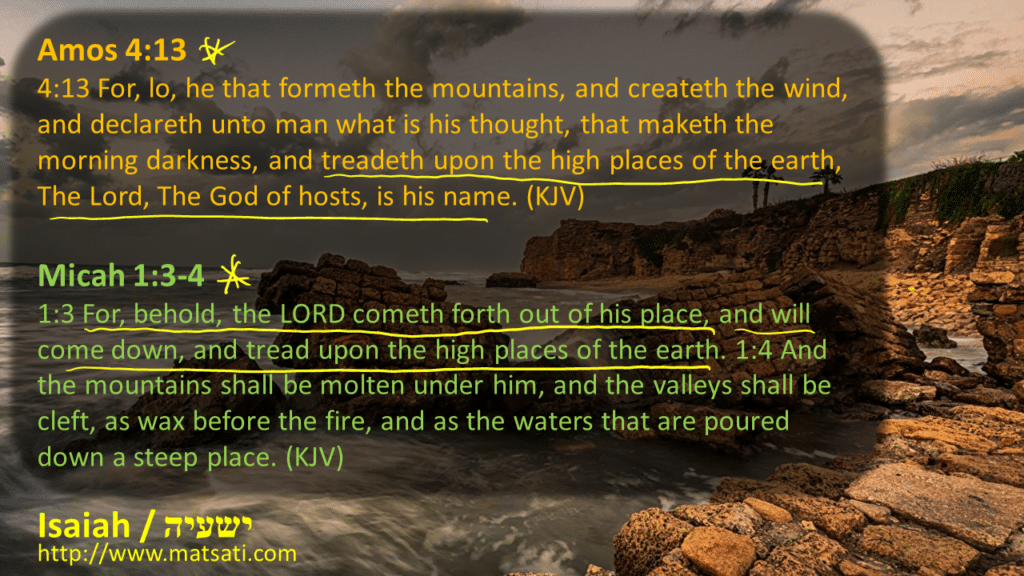
Amos 4:13
4:13 For, lo, he that formeth the mountains, and createth the wind, and declareth unto man what is his thought, that maketh the morning darkness, and treadeth upon the high places of the earth, The Lord, The God of hosts, is his name. (KJV)
Micah 1:3-4
1:3 For, behold, the LORD cometh forth out of his place, and will come down, and tread upon the high places of the earth. 1:4 And the mountains shall be molten under him, and the valleys shall be cleft, as wax before the fire, and as the waters that are poured down a steep place. (KJV)
These high mountain places of worship provide this perception of the power of God, and so they were places for offering sacrifices to the gods. This is what the author of Isaiah is describing as the level of man’s pride, as striving for to be greater than the heights of heaven.
ספר ישעיה פרק יד
טו אַךְ אֶל-שְׁאוֹל תּוּרַד אֶל-יַרְכְּתֵי-בוֹר:
Isaiah 14:15 states, “Yet thou shalt be brought down to hell, to the sides of the pit. (אַךְ אֶל-שְׁאוֹל תּוּרַד אֶל-יַרְכְּתֵי-בוֹר)” Pride in and of itself shall lead to the downfall, as Isaiah states that because of these things, this one who exalts himself will be brought down to the grave, to hell, to the pit! This king in his price is brought down low, humbled, and he dies. Remember from the Torah perspective, in Bereshit / Genesis 3 the claim was that the forbidden fruit would make them like God (Bereshit / Genesis 3:5). This however was farther from the truth, as eating the fruit and participating in disobedience led to sin and the curse of sin, not just upon man but upon all the world. These things describe the disgrace of sin, and the terrible fate of those who are unrepentant before God.
ספר ישעיה פרק יד
טז רֹאֶיךָ אֵלֶיךָ יַשְׁגִּיחוּ אֵלֶיךָ יִתְבּוֹנָנוּ הֲזֶה הָאִישׁ מַרְגִּיז הָאָרֶץ מַרְעִישׁ מַמְלָכוֹת: יז שָֹם תֵּבֵל כַּמִּדְבָּר וְעָרָיו הָרָס אֲסִירָיו לֹא-פָתַח בָּיְתָה:
Isaiah 14:16 states, “They that see thee shall narrowly look upon thee, and consider thee, (רֹאֶיךָ אֵלֶיךָ יַשְׁגִּיחוּ אֵלֶיךָ יִתְבּוֹנָנוּ) saying, Is this the man that made the earth to tremble, that did shake kingdoms; (הֲזֶה הָאִישׁ מַרְגִּיז הָאָרֶץ מַרְעִישׁ מַמְלָכוֹת)” Isaiah 14:17 “That made the world as a wilderness, (שָֹם תֵּבֵל כַּמִּדְבָּר) and destroyed the cities thereof; that opened not the house of his prisoners? (וְעָרָיו הָרָס אֲסִירָיו לֹא-פָתַח בָּיְתָה)” When the Lord humbles this great king, the people ask the question, הֲזֶה הָאִישׁ מַרְגִּיז הָאָרֶץ מַרְעִישׁ מַמְלָכוֹת “Is this the man that made the earth to tremble, that did shake kingdoms?” The people observing the corpse of the Babylonian king reminds us of Isaiah 66:24.
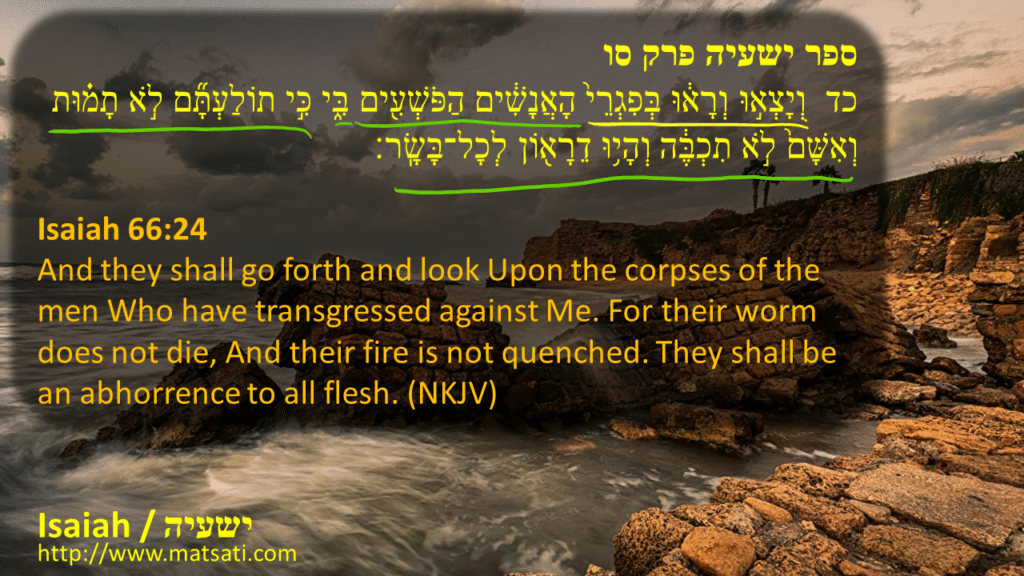
ספר ישעיה פרק סו
כד וְיָצְא֣וּ וְרָא֔וּ בְּפִגְרֵי֙ הָאֲנָשִׁ֔ים הַפֹּשְׁעִ֖ים בִּ֑י כִּ֣י תוֹלַעְתָּ֞ם לֹ֣א תָמ֗וּת וְאִשָּׁם֙ לֹ֣א תִכְבֶּ֔ה וְהָי֥וּ דֵרָא֖וֹן לְכָל־בָּשָֽׂר׃
Isaiah 66:24
And they shall go forth and look Upon the corpses of the men Who have transgressed against Me. For their worm does not die, And their fire is not quenched. They shall be an abhorrence to all flesh. (NKJV)
The people of God will inspect the bodies of those who are perishing. Here the situation is that in this world thus king had wealth, power, and everything he wanted. In the Olam Haba the tables are changed. The point is this world is preparation for the world to come (Olam Haba). In the Olam hazeh (this world) he caused terror and sorrow in others. In the Olam Haba the terror and sorrow is his reward. What we are being taught is that this world belongs to God and all that we have is a gift. Simply put, pride takes a person away from the truth. This is a spiritual malady, because based upon what Isaiah has been telling us, pride denies the Lord God in heaven. Solomon wrote in Mishley / Proverbs 16:18 “Pride goes before destruction, a haughty spirit before a fall.” in 16:19 he says, “Better to live humbly with the poor than to share plunder with the proud.” What we are being taught is that it is better to live humbly so that we can seek the Lord than to love pridefully and end up like this Babylonian king. Isaiah goes on saying the following:
ספר ישעיה פרק יד
יח כָּל-מַלְכֵי גוֹיִם כֻּלָּם שָׁכְבוּ בְכָבוֹד אִישׁ בְּבֵיתוֹ: יט וְאַתָּה הָשְׁלַכְתָּ מִקִּבְרְךָ כְּנֵצֶר נִתְעָב לְבוּשׁ הֲרֻגִים מְטֹעֲנֵי חָרֶב יוֹרְדֵי אֶל-אַבְנֵי-בוֹר כְּפֶגֶר מוּבָס:
Isaiah 14:18 states, “All the kings of the nations, even all of them, (ל-מַלְכֵי גוֹיִם כֻּלָּם) lie in glory, every one in his own house. (שָׁכְבוּ בְכָבוֹד אִישׁ בְּבֵיתוֹ)” Isaiah 14:19 “But thou art cast out of thy grave like an abominable branch, (וְאַתָּה הָשְׁלַכְתָּ מִקִּבְרְךָ כְּנֵצֶר נִתְעָב) and as the raiment of those that are slain, thrust through with a sword, (לְבוּשׁ הֲרֻגִים מְטֹעֲנֵי חָרֶב) that go down to the stones of the pit; as a carcase trodden under feet. (יוֹרְדֵי אֶל-אַבְנֵי-בוֹר כְּפֶגֶר מוּבָס)” Isaiah 14:18 the kings of the earth lying in glory, this reminds us of the honorable burial, like the words described in 2 Kings 12:22 וַיִּקְבְּר֥וּ אֹת֛וֹ עִם־אֲבֹתָ֖יו בְּעִ֣יר דָּוִ֑ד “was buried with his ancestors in the City of David.” These burials were honorable to be buried with their ancestors. This Babylonian King however because of his pride will not be buried in the tomb of his ancestors. The way Isaiah speaks according to Isaiah 14:19, the idea is he doesn’t even find a place to rest after death. The king is cast out of the grave. Isaiah says he is like a כְּנֵצֶר נִתְעָב “abominable branch.” When performing an internet search to study what has been said concerning this kind of branch and its previous usage. Interestingly, what comes up is related to a video game called “Elden Ring.” This video game consists of casting spells and fighting various other worldly creatures. This term “abominable branch” is a mod to the game that helps fighting monsters. The description of this states, “The Abominable Branch is made up of Nether Bees that become more and more evil as you breed them. By the time you’ve bred them to perfection, they can kill within seconds. They are called the ‘Infernal Bee’ or the ‘Magic Bee.’” The purpose for mentioning this is that the video game description is that of ever-increasing wickedness or evil. This is the description of the abominable branch, and provides us with an interesting modern perspective on Isaiah’s ancient words describing this wicked king. This also provides us with a parallel description to the evil one (Satan / Lucifer). Isaiah goes on to say לְבוּשׁ הֲרֻגִים מְטֹעֲנֵי חָרֶב he who is “clothed with the dead (slain) who are pierced with the sword.” The description here is of this one being clothed with the blood of the slain. Note the antithesis to what the Messiah did, giving his own blood for the forgiveness of sins as opposed to the one who would kill, steal, and destroy, being clothed with those who he has slain. The word לְבוּשׁ describes the nature of this evil one, being covered with corpses. Note that we serve the God of the living (see Mark 12:26-27). The evil one based upon these descriptions is a god of the dead, death, destruction, suffering, etc. The idea is that the intended purpose of these descriptions is that this one who delighted in destruction and oppression has nothing in the afterlife, with only death and the dead as his shroud. Note what Yeshua taught concerning treasures in the world to come.
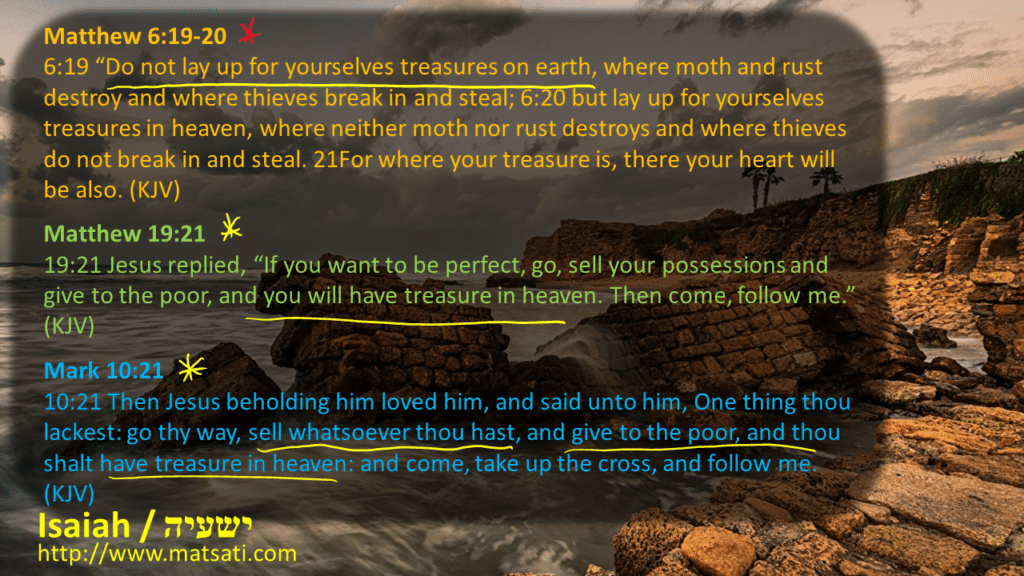
Matthew 6:19-20
6:19 “Do not lay up for yourselves treasures on earth, where moth and rust destroy and where thieves break in and steal; 6:20 but lay up for yourselves treasures in heaven, where neither moth nor rust destroys and where thieves do not break in and steal. 21For where your treasure is, there your heart will be also. (KJV)
Matthew 19:21
19:21 Jesus replied, “If you want to be perfect, go, sell your possessions and give to the poor, and you will have treasure in heaven. Then come, follow me.” (KJV)
Mark 10:21
10:21 Then Jesus beholding him loved him, and said unto him, One thing thou lackest: go thy way, sell whatsoever thou hast, and give to the poor, and thou shalt have treasure in heaven: and come, take up the cross, and follow me. (KJV)
The point is the kind of God we serve encourages having mercy, being forgiving, and showing kindness to others and love, as opposed to being filled with hatred, war, oppression, and a blood thirst. The Lord God who calls us is filled with love for us and desires that we have this kind of attitude, to love God and love one another!
ספר ישעיה פרק יד
כ לֹא-תֵחַד אִתָּם בִּקְבוּרָה כִּי-אַרְצְךָ שִׁחַתָּ עַמְּךָ הָרָגְתָּ לֹא-יִקָּרֵא לְעוֹלָם זֶרַע מְרֵעִים: כא הָכִינוּ לְבָנָיו מַטְבֵּחַ בַּעֲוֹן אֲבוֹתָם בַּל-יָקֻמוּ וְיָרְשׁוּ אָרֶץ וּמָלְאוּ פְנֵי-תֵבֵל עָרִים:
Isaiah 14:20 states, “Thou shalt not be joined with them in burial, (לֹא-תֵחַד אִתָּם בִּקְבוּרָה) because thou hast destroyed thy land, (כִּי-אַרְצְךָ שִׁחַתָּ) and slain thy people: the seed of evildoers shall never be renowned. (מְּךָ הָרָגְתָּ לֹא-יִקָּרֵא לְעוֹלָם זֶרַע מְרֵעִים)” Isaiah 14:21 “Prepare slaughter for his children for the iniquity of their fathers; (הָכִינוּ לְבָנָיו מַטְבֵּחַ בַּעֲוֹן אֲבוֹתָם) that they do not rise, nor possess the land, nor fill the face of the world with cities. (בַּל-יָקֻמוּ וְיָרְשׁוּ אָרֶץ וּמָלְאוּ פְנֵי-תֵבֵל עָרִים)” Notice something here about what Isaiah is saying according to Isaiah 14:20. He says לֹא-תֵחַד אִתָּם בִּקְבוּרָה “do not be joined with them in burial.” This suggests that for those who participate in the same kinds of sins, they will be joined with them in the afterlife. Kind of like what we read according to Matthew 25:31-46.
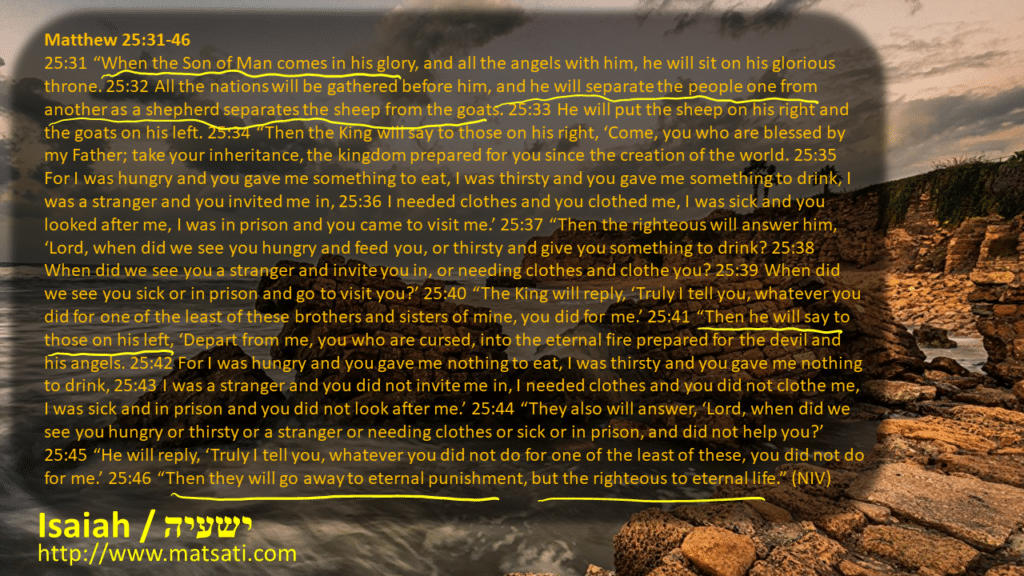
Matthew 25:31-46
25:31 “When the Son of Man comes in his glory, and all the angels with him, he will sit on his glorious throne. 25:32 All the nations will be gathered before him, and he will separate the people one from another as a shepherd separates the sheep from the goats. 25:33 He will put the sheep on his right and the goats on his left. 25:34 “Then the King will say to those on his right, ‘Come, you who are blessed by my Father; take your inheritance, the kingdom prepared for you since the creation of the world. 25:35 For I was hungry and you gave me something to eat, I was thirsty and you gave me something to drink, I was a stranger and you invited me in, 25:36 I needed clothes and you clothed me, I was sick and you looked after me, I was in prison and you came to visit me.’ 25:37 “Then the righteous will answer him, ‘Lord, when did we see you hungry and feed you, or thirsty and give you something to drink? 25:38 When did we see you a stranger and invite you in, or needing clothes and clothe you? 25:39 When did we see you sick or in prison and go to visit you?’ 25:40 “The King will reply, ‘Truly I tell you, whatever you did for one of the least of these brothers and sisters of mine, you did for me.’ 25:41 “Then he will say to those on his left, ‘Depart from me, you who are cursed, into the eternal fire prepared for the devil and his angels. 25:42 For I was hungry and you gave me nothing to eat, I was thirsty and you gave me nothing to drink, 25:43 I was a stranger and you did not invite me in, I needed clothes and you did not clothe me, I was sick and in prison and you did not look after me.’ 25:44 “They also will answer, ‘Lord, when did we see you hungry or thirsty or a stranger or needing clothes or sick or in prison, and did not help you?’ 25:45 “He will reply, ‘Truly I tell you, whatever you did not do for one of the least of these, you did not do for me.’
25:46 “Then they will go away to eternal punishment, but the righteous to eternal life.” (NIV)
Note the distinct differences between the goats and the sheep. Goats wander off and like to do their own thing whereas the sheep even though they need more care follow their shepherd. The description given here in Matthew 25:31-46 speaks of the goats being gathered together at the judgment day. This is similar to what Isaiah is saying concerning the wicked according to Isaiah 14:20, of being joined with one another in the afterlife, or the grave per the descriptions here. The “Sheep” follows Yeshua (Jesus) walking in his footsteps whereas the “goats” do not! Yeshua’s footsteps are based upon the holy Scriptures, and so the one who walks in Yeshua’s footsteps is living his life according to God’s Word. Pride and arrogance have fueled these tyrants’ evils, and we are being told the end result of those who do these things, living for themselves as opposed to living for the Lord God Almighty in heaven. Isaiah goes on saying, הָכִינוּ לְבָנָיו מַטְבֵּחַ בַּעֲוֹן אֲבוֹתָם בַּל-יָקֻמוּ וְיָרְשׁוּ אָרֶץ וּמָלְאוּ פְנֵי-תֵבֵל עָרִים “Prepare slaughter for his children for the iniquity of their fathers; that they do not rise, nor possess the land, nor fill the face of the world with cities.” The final outcome for those who live as the fallen one does, will be their destruction. We note the history of Israel according to 2 Kings 12-25 and how the kings of Israel would either וַיַּ֨עַשׂ …הַיָּשָׁ֛ר בְּעֵינֵ֥י יְהוָ֖ה כָּל־יָמָ֑יו “do what was right in the eyes of the Lord all of their days,” (2 Kings 12:3) or וַיַּ֥עַשׂ הָרַ֖ע בְּעֵינֵ֣י יְהוָ֑ה “do what was evil in the eyes of the Lord.” (2 Kings 13:2) The reign of the king would be long for those who did וַיַּ֨עַשׂ הַיָּשָׁ֛ר (did what was right) as opposed to a short reign for those who וַיַּ֥עַשׂ הָרַ֖ע (did what was evil). When a righteous king came, they would do what they could to erase the evils of the former king, destroying the places of worship (baal and ashtaroth) but we are told they would not remove the high places. These that remained continued as a poison to the people of Israel. This is why Isaiah speaks of the Lord ultimately needing to remove all sin and wickedness from the earth. Pride ends in forgetting the one who was prideful, his memory and his actions go unremembered, destroyed by death, and those wanting to forget the evils of his reign. On the other hand, Isaiah states that those who humble themselves by laying aside their pride, who are the servants of the Living God, will live forever in His memory. (see Isaiah 11:10-16, 25:6-8, 26:19, 27:13, 40:27-31, and 54:7-8)
Rabbinic Commentary on Isaiah 14:11-21
The Targum Jonathan is an Aramaic and Rabbinic translation of the book of Isaiah and thus an important text to read as we study Isaiah from the Hebrew bible.
תרגום יונתן בן עוזיאל אל ישעיה פרק יד:יא-כא
יא אִיתַחַת לִשאֹול יְקָרָך תֻשבְחַת זְמָרָך תְחֹותָך יְשַוֹון רִימָא וְעֵיל מִינָך רִחשָא׃ יב אֵיכְדֵין אִתרְכֵינתָא מִן רוּמָא דַהְוֵיתָא זֵיוְתָן בְגֹו בְנֵי אְנָשָא כְכֹוכְבֵי נַגהָא בֵין כֹוכְבַיָא אִתרְטֵישתָא לְאַרעָא דַהְוֵיתָא קָטֵיל בְעַמְמַיָא׃ יג וְאַת אְמַרת בְלִיבָך לְרוּמָא אַסַק עֵיל מִן עַמֵיה דַאְלָהָא אְשַוֵי כוּרסֵי מַלכוּתִי וְאַתֵיב בְטוּר זְמַן בִסיָפֵי צִיפוּנָא׃ יד אַסַק עִילָוֵי כָל עַמָא אֵיהֵי עִלַאי מִכוּלְהֹון׃ טו בְרַם לִשאֹול תִיתַחַת לִסיָפֵי גוּב בֵית אַבדָנָא׃ טז חָזָך עְלָך יְדִיקוּן בָך יִסתַכְלוּן יֵימְרוּן הְדֵין גוּברָא אְזִיַע אַרעָא אַצדִי מַלכְווָתָא׃ יז שַוִי תֵבֵל כְמַדבְרָא וְקִרוֹוהִי פַגַר לַאְסִירֹוהִי לָא פְתַח תַרעָא׃ יח כָל מַלכֵי עַמְמַיָא כוּלְהֹון שָכְבִין בִיקָר גְבַר בְבֵית עָלְמֵיה׃ יט וְאַת אִתרְכֵינתָא מִקִברָך כְיַחַט טְמִיר חַפִי קְטִילִין מְטָעְנֵי חְרַב נָחְתֵי לְגוּב בֵית אַבדָנָא כְפַגַר מְדַשדַש׃ כ לָא תְהֵי כְחַד מִינְהֹון בִקבוּרָא אְרֵי אַרעָך חַבֵילתָא עַמָך קַטֵילתָא לָא יִתקַייַם לְעָלַם זַרַע מַבאְשִין׃ כא אַתקִינוּ לִבנֵיהֹון קְטֹול בְחֹובֵי אְבָהָתְהֹון דִלמָא יְקוּמוּן וְיַחסְנוּן אַרעָא וְיִמלֹון אַפֵי תֵבֵל בַעְלֵי דְבָב׃
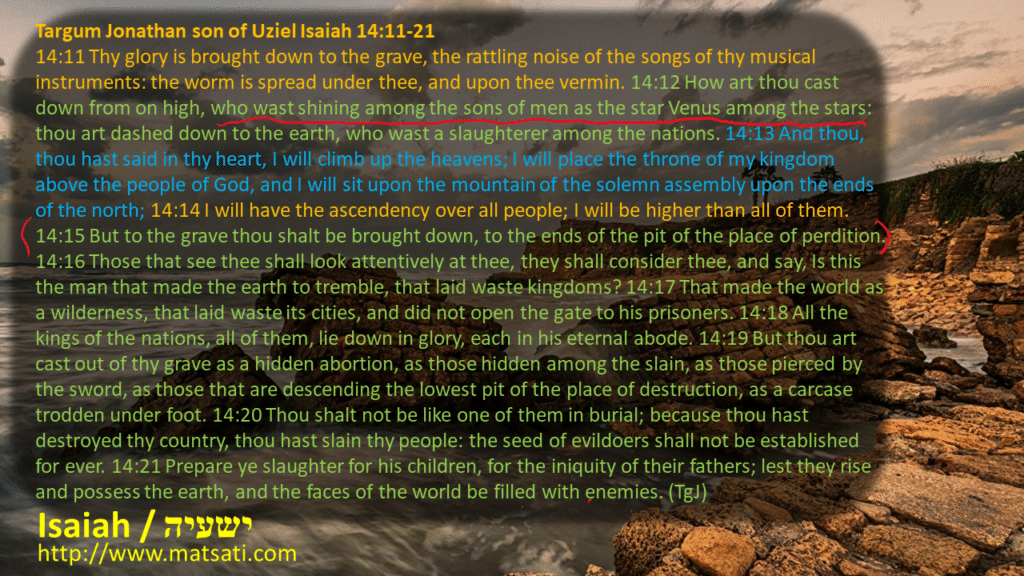
Targum Jonathan son of Uziel Isaiah 14:11-21
14:11 Thy glory is brought down to the grave, the rattling noise of the songs of thy musical instruments: the worm is spread under thee, and upon thee vermin. 14:12 How art thou cast down from on high, who wast shining among the sons of men as the star Venus among the stars: thou art dashed down to the earth, who wast a slaughterer among the nations. 14:13 And thou, thou hast said in thy heart, I will climb up the heavens; I will place the throne of my kingdom above the people of God, and I will sit upon the mountain of the solemn assembly upon the ends of the north; 14:14 I will have the ascendency over all people; I will be higher than all of them. 14:15 But to the grave thou shalt be brought down, to the ends of the pit of the place of perdition. 14:16 Those that see thee shall look attentively at thee, they shall consider thee, and say, Is this the man that made the earth to tremble, that laid waste kingdoms? 14:17 That made the world as a wilderness, that laid waste its cities, and did not open the gate to his prisoners. 14:18 All the kings of the nations, all of them, lie down in glory, each in his eternal abode. 14:19 But thou art cast out of thy grave as a hidden abortion, as those hidden among the slain, as those pierced by the sword, as those that are descending the lowest pit of the place of destruction, as a carcase trodden under foot. 14:20 Thou shalt not be like one of them in burial; because thou hast destroyed thy country, thou hast slain thy people: the seed of evildoers shall not be established for ever. 14:21 Prepare ye slaughter for his children, for the iniquity of their fathers; lest they rise and possess the earth, and the faces of the world be filled with enemies. (TgJ)
While surveying the rabbinic literature regarding Isaiah 14:11-21, It was very interesting to see how often Isaiah 14:11-21 has influenced rabbinic Midrash. Midrash מִדְרָשׁ is an ancient rabbinic commentary on the Hebrew scriptures. The earliest Midrashim come from the 2nd century AD, and it is believed these were passed down through oral tradition and therefore the content is much older than this. Midrash is an expansive interpretation of the Masoretic text using Jewish exegesis, a rabbinic mode of interpretation prominent in the Talmud. The word itself means “textual interpretation,” or “study,” derived from the root verb darash (דָּרַשׁ), which means “resort to, to seek, to enquire.” This term is also used of rabbinic works that interpret Scripture using this technique. Such works also contain early interpretations and commentaries on the Torah of Moshe and the Mishnah (Oral Torah), Aggadah, and Halakha. The Midrashim form a commentary on specific passages in the Hebrew Scripture (Tanakh).
A statistical analysis of the occurrences of Isaiah 14:11-21 in the Midrashim are as follows:
Isaiah 14:11 – Kohelet Rabbah (1), Mekhilta d’Rabbi Yishmael (1), Ruth Rabbah (1)
Isaiah 14:12 – Ein Yaakov (1), Midrash Lekach Tov (1), Midrash Tanchuma (1), Otzar Midrashim (1), Shemot Rabbah (1), Shir HaShirim Rabbah (1)
Isaiah 14:13 – Bamidbar Rabbah (1), Mekhilta DeRabbi Shimon Bar Yochai (1), Mekhilta d’Rabbi Yishmael (1), Midrash Tanchuma (3), Midrash Tanchuma Buber (2), Midrash Tehillim (1), Shemot Rabbah (1), Tanna Debei Eliyahu Rabbah (1), Vayikra Rabbah (1), Yalkut Shimoni on Torah (1)
Isaiah 14:14 – Bamidbar Rabbah (2), Ein Yaakov (3), Ein Yaakov (Glick Edition) (1), Mekhilta d’Rabbi Yishmael (1), Midrash Aggadah (2), Midrash Lekach Tov (1), Midrash Sekhel Tov (1), Midrash Tanchuma (4), Midrash Tanchuma Buber (3), Otzar Midrashim (1), Pirkei DeRabbi Eliezer (1), Shemot Rabbah (1), Tanna debei Eliyahu Zuta (1), Yalkut Shimoni on Torah (2)
Isaiah 14:15 – Bamidbar Rabbah (1), Ein Yaakov (1), Midrash Lekach Tov (1), Midrash Tanchuma (2), Midrash Tanchuma Buber (1), Pirkei DeRabbi Eliezer (1), Shemot Rabbah (1), Tanna Debei Eliyahu Rabbah (1)
Isaiah 14:16 – Tanna Debei Eliyahu Rabbah (1)
Isaiah 14:17 – Bereishit Rabbah (1), Midrash Lekach Tov on Esther (1), Midrash Sekhel Tov (1), Midrash Tanchuma (1), Midrash Tanchuma Buber (1), Vayikra Rabbah (2), Yalkut Shimoni on Torah (1)
Isaiah 14:18 – Otzar Midrashim (1)
Isaiah 14:19 – Midrash Tanchuma (2), Pirkei DeRabbi Eliezer (1), Seder Olam Rabbah (1), Tanna Debei Eliyahu Rabbah (1), Vayikra Rabbah (1)
Isaiah 14:20 – Midrash Lekach Tov (1), Otzar Midrashim (1)
Isaiah 14:21 – Esther Rabbah (1)
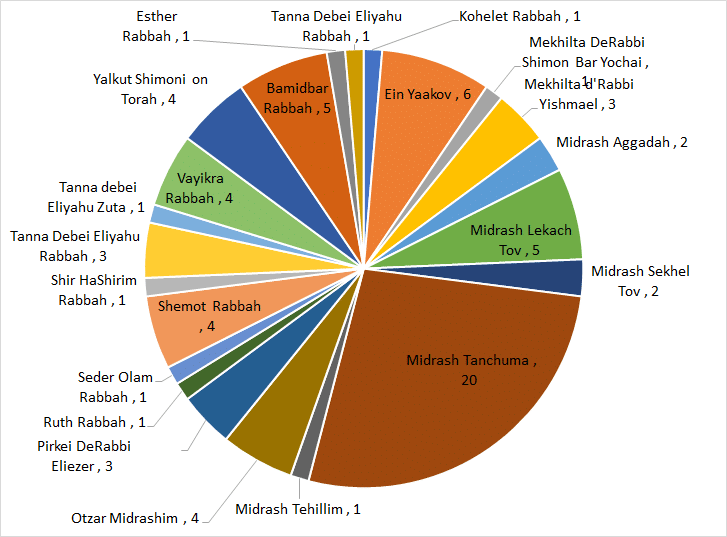
We can see the largest distribution of citations of these verses from Isaiah 14:11-21 occur in Midrash Tanchuma with 20 citations.
According to the TgJ, Isaiah states the following, יא אִיתַחַת לִשאֹול יְקָרָך תֻשבְחַת זְמָרָך תְחֹותָך יְשַוֹון רִימָא וְעֵיל מִינָך רִחשָא׃ 14:11 Thy glory is brought down to the grave, the rattling noise of the songs of thy musical instruments: the worm is spread under thee, and upon thee vermin. (TgJ) There appears to be a combination of things going on here in Isaiah 14:11, (i) the king is going down to the grave, (ii) it appears as if there is celebration going on with the idea of rattling noise of songs, and (iii) the reality of the grave is decay, decomposition, and destruction indicated by the worm that consumes a carcass. There will be no celebration in the grave or in hell. This is the classic response for those who do not know the Lord or understand how the outcome of this life affects the afterlife. Mekhilta d’Rabbi Yishmael 15.11 Part 1 has the following to say concerning this verse.
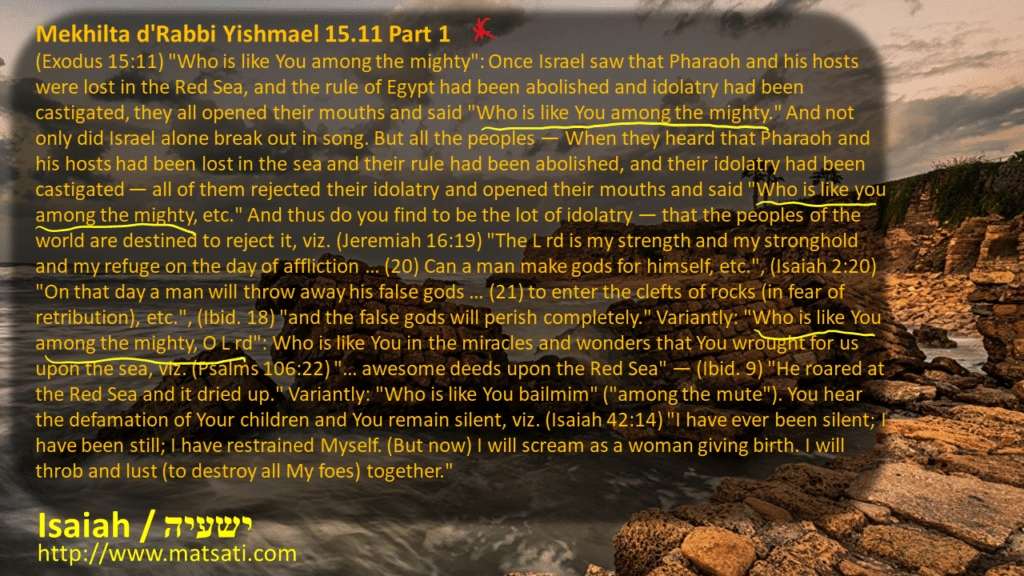
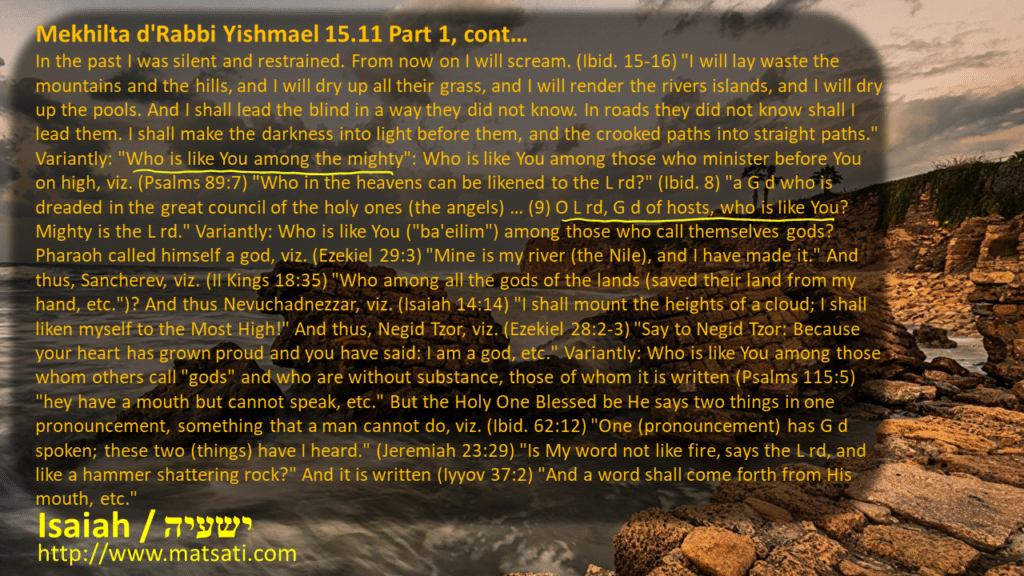
Mekhilta d’Rabbi Yishmael 15.11 Part 1
מי כמכה באלים ה’, כיון שראו ישראל שאבד פרעה וחילו בים סוף ובטלה מלכותן של מצרים ונעשו שפטים בעבודה זרה שלהן פתחו פיהם ואמרו כלם מי כמוך באלים ולא ישראל בלבד אמרו שירה אלא אף האומות כששמעו שאבד פרעה ומצרים בים ובטלה מלכותם של מצריים ונעשו שפטים בעבודה זרה שלהן כפרו כולן בעבודה זרה שלהן ופתחו פיהם כולן והודו למרום ואמרו (שמות טו יא) מי כמוך באלים וגו’. וכן את מוצא שעתידין אומות העולם לכפור בעבודה זרה שלהן שנ’ (ירמיה טז יט-כ) ה’ עוזי ומעוזי ומנוסי ביום צרה וגו’ היעשה לו אדם אלהים וגו’ ואו’ (ישעיה ב כ) ביום ההוא ישליך האדם וגו’ ואומר (ישעיה ב כא) לבא בנקרת הצורים וגו’ ואחריו מה כתיב (ישעיה ב יח) והאלילים כליל יחלף. ד”א (שמות טו יא) מי כמוך באלים ה’ מי כמוכה באלמים מי כמוך בנסים וגבורות שעשית לנו על הים שנ’ (תהלים קו כב) נוראות על ים סוף וגו’ (תהלים קו ט) ויגער בים סוף ויחרב. [ד”א (שמות טו יא) מי כמוכה באלים ה’ מי כמוך באלמים מי כמוך שומע עלבון בניך ושותק שנאמר (ישעיה מב יד) החשתי מעולם אחריש אתאפק כיולדה אפעה אשום ואשאף יחד לשעבר אחריש אתאפק מכאן ואילך כיולדה אפעה. (ישעיה מב טו-טז) אחריב הרים וגבעות וכל עשבם אוביש והולכתי עורים בדרך לא ידעו בנתיבות לא ידעו אדריכם אשים מחשך לפניהם לאור ומעקשים למישור. ד”א (שמות טו יא) מי כמוך באלים מי כמוך באלו שמשמשין לפניך במרום שנ’ (תהלים פט ז) כי מי בשחק יערוך לה’ ואומר (תהלים פט ח-ט) אל נערץ בסוד קדושים רבה וגו’ ה’ אלהי צבאות מי כמוך חסין יה. [ד”א מי כמוכה באלים ה’] מי כמוך באלו שקורים עצמם אלוהות. פרעה קרא עצמו אלוה שנ’ (יחזקאל כט ג) יען אמר לי יארי ואני עשיתני, וכן סנחריב שנ’ (מלכים ב יח לה) מי בכל אלהי הארצות וגו’ וכן נבוכדנצר שנ’ (ישעיה יד יא) אעלה על במתי עב וגו’ וכן נגיד צור שנ’ (יחזקאל כח ב) בן אדם אמור לנגיד צור כה אמר ה’ אלהים יען גבה לבך וגו’. (שמות טו יא) מי כמוכה באלים ה’ מי כמוכה באלו שאחרים קורין אותם אלוהות ואין בהם ממש ועליהם נאמר (תהלים קטו ה) פה להם ולא ידברו וגו’ אלו פה להם ולא ידברו אבל הקב”ה אומר שני דברים בדבור אחד מה שאי אפשר לבשר ודם לעשות כן שנ’ (תהלים סב יב) אחת דבר אלהים שתים זו שמעתי וגו’. (ירמיה כג כט) הלא כה דברי כאש נאם ה’. וכתיב (איוב לז ב) והגה מפיו יוצא:
(Exodus 15:11) “Who is like You among the mighty”: Once Israel saw that Pharaoh and his hosts were lost in the Red Sea, and the rule of Egypt had been abolished and idolatry had been castigated, they all opened their mouths and said “Who is like You among the mighty.” And not only did Israel alone break out in song. But all the peoples — When they heard that Pharaoh and his hosts had been lost in the sea and their rule had been abolished, and their idolatry had been castigated — all of them rejected their idolatry and opened their mouths and said “Who is like you among the mighty, etc.” And thus do you find to be the lot of idolatry — that the peoples of the world are destined to reject it, viz. (Jeremiah 16:19) “The L rd is my strength and my stronghold and my refuge on the day of affliction … (20) Can a man make gods for himself, etc.”, (Isaiah 2:20) “On that day a man will throw away his false gods … (21) to enter the clefts of rocks (in fear of retribution), etc.”, (Ibid. 18) “and the false gods will perish completely.” Variantly: “Who is like You among the mighty, O L rd”: Who is like You in the miracles and wonders that You wrought for us upon the sea, viz. (Psalms 106:22) “… awesome deeds upon the Red Sea” — (Ibid. 9) “He roared at the Red Sea and it dried up.” Variantly: “Who is like You bailmim” (“among the mute”). You hear the defamation of Your children and You remain silent, viz. (Isaiah 42:14) “I have ever been silent; I have been still; I have restrained Myself. (But now) I will scream as a woman giving birth. I will throb and lust (to destroy all My foes) together.” In the past I was silent and restrained. From now on I will scream. (Ibid. 15-16) “I will lay waste the mountains and the hills, and I will dry up all their grass, and I will render the rivers islands, and I will dry up the pools. And I shall lead the blind in a way they did not know. In roads they did not know shall I lead them. I shall make the darkness into light before them, and the crooked paths into straight paths.” Variantly: “Who is like You among the mighty”: Who is like You among those who minister before You on high, viz. (Psalms 89:7) “Who in the heavens can be likened to the L rd?” (Ibid. 8) “a G d who is dreaded in the great council of the holy ones (the angels) … (9) O L rd, G d of hosts, who is like You? Mighty is the L rd.” Variantly: Who is like You (“ba’eilim”) among those who call themselves gods? Pharaoh called himself a god, viz. (Ezekiel 29:3) “Mine is my river (the Nile), and I have made it.” And thus, Sancherev, viz. (II Kings 18:35) “Who among all the gods of the lands (saved their land from my hand, etc.”)? And thus Nevuchadnezzar, viz. (Isaiah 14:14) “I shall mount the heights of a cloud; I shall liken myself to the Most High!” And thus, Negid Tzor, viz. (Ezekiel 28:2-3) “Say to Negid Tzor: Because your heart has grown proud and you have said: I am a god, etc.” Variantly: Who is like You among those whom others call “gods” and who are without substance, those of whom it is written (Psalms 115:5) “hey have a mouth but cannot speak, etc.” But the Holy One Blessed be He says two things in one pronouncement, something that a man cannot do, viz. (Ibid. 62:12) “One (pronouncement) has G d spoken; these two (things) have I heard.” (Jeremiah 23:29) “Is My word not like fire, says the L rd, and like a hammer shattering rock?” And it is written (Iyyov 37:2) “And a word shall come forth from His mouth, etc.”
The Midrash speaks of the power of God over these mighty kings, as God demonstrates His power and these kings declare “Who is like You among the mighty.” One of the greatest mistakes that one can make is to forget the beloved status of being a child of God. When we forget who we are, this leads to not remembering the Lord God Almighty and His power to deliver us from any situation. We are told according to the Torah that God has chosen us as an am segulah (עם סגלה) “a treasured people out of all the peoples who are on the face of the earth” (Devarim / Deuteronomy 14:1-2). Here from the Torah Moshe reminds the people who they are, the children of the Most High God, and that He is eternal, and that we are always in His hands. As the Creator God He is the אֱלהֵי הָרוּחת לְכָל־בָּשָׂר “God of the spirits of all flesh” and therefore has authority to do as he wills for His purposes. These purposes are for righteousness, holiness, and truth! We note the covenant at the mountain of Sinai that was made prior to the giving of the Torah according to Shemot / Exodus 19:5-6, “Now therefore, if you will indeed obey my voice and keep my covenant, you shall be my possession more than all other peoples (סְגֻלָּה מִכָּל־הָעַמִּים), for all the earth is mine; and you shall be to me a kingdom of priests and a holy nation.” The order of the narrative is so important to illustrate the position of the Torah in our lives; the Lord God works mighty and powerful miracles in our lives delivering and redeeming us, we enter into a covenant relationship with God first, then He gives us His Torah to walk in. The Torah follows after one has been saved in the covenant of God! This reveals the mercy and love of God from the beginning! The word סְגֻלָּה essentially means valuable “personal property,” which is kept in a safe place, such as David’s treasure of gold and silver which he donated to the Temple (see 1 Chronicles 29:3), or Solomon’s treasure collected from the kings and provinces (see Ecclesiastes 2:8). These things reveal to us without a doubt how precious God’s redeemed people are being regarded as a treasured group of people from among the nations of the earth. Midrash Ruth Rabbah Parashat 3 Part 3 has the following today concerning this verse.
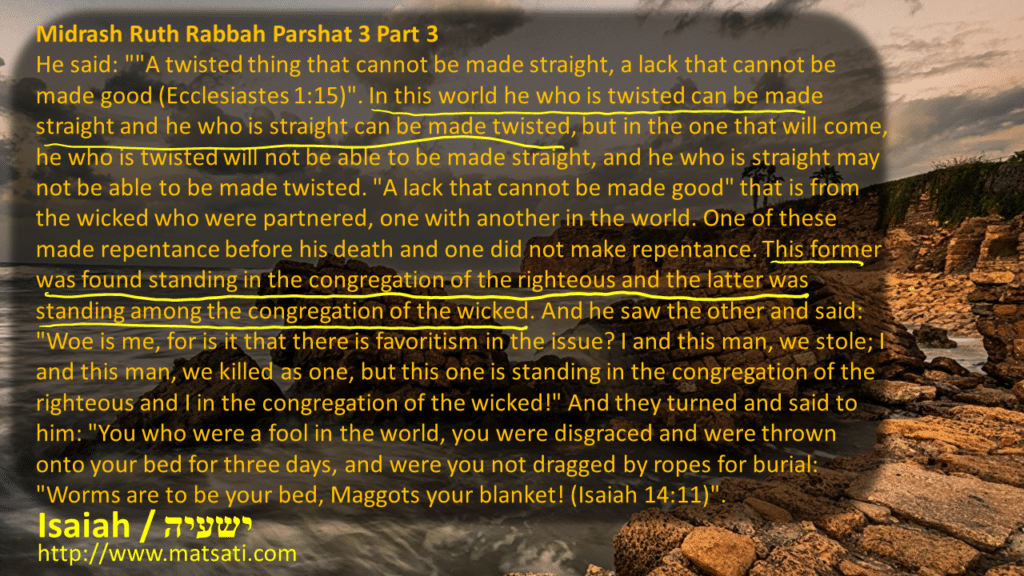
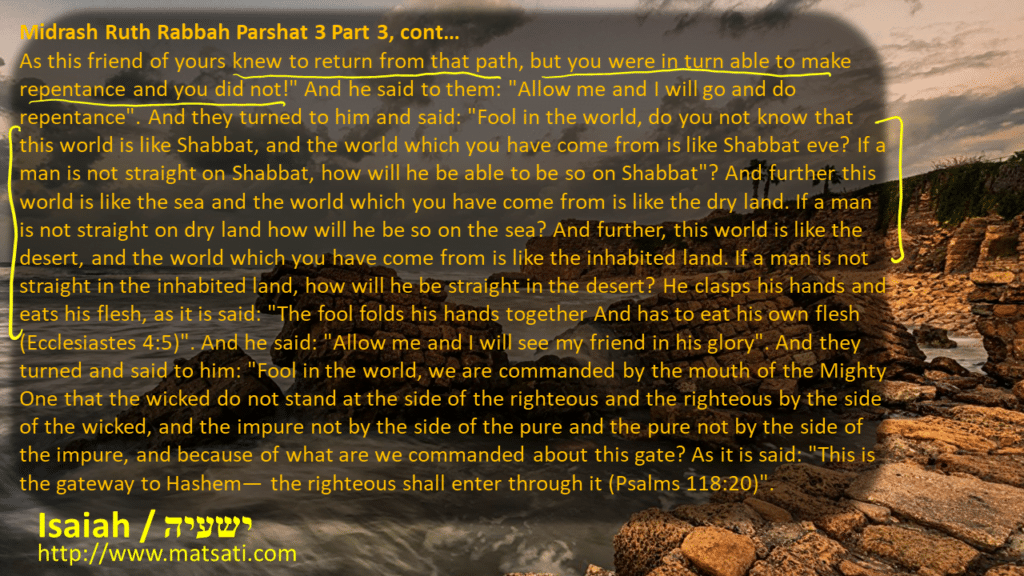
Midrash Ruth Rabbah Parshat 3 Part 3
אָמַר (קהלת א, טו): מְעֻוָּת לֹא יוּכַל לִתְקֹן וְחֶסְרוֹן לֹא יוּכַל לְהִמָּנוֹת, בָּעוֹלָם הַזֶּה מִי שֶׁהוּא מְעֻוָּת יָכוֹל לִתְקֹן, וּמִי שֶׁהוּא מְתֻקָּן יָכוֹל לְעַוֵּת, אֲבָל לֶעָתִיד לָבוֹא מִי שֶׁהוּא מְעֻוָּת אֵין יָכוֹל לִתְקֹן, וּמִי שֶׁהוּא מְתֻקָּן אֵין יָכוֹל לְעַוֵּת. וְחֶסְרוֹן לֹא יוּכַל לְהִמָּנוֹת, יֵשׁ מֵהָרְשָׁעִים שֶׁמִּזְדַּוְּגִין זֶה עִם זֶה בָּעוֹלָם, אֶחָד מֵהֶן עָשָׂה תְּשׁוּבָה לִפְנֵי מוֹתוֹ וְאֶחָד לֹא עָשָׂה תְּשׁוּבָה, נִמְצָא זֶה עוֹמֵד בַּחֲבוּרַת הַצַּדִּיקִים, וְזֶה עוֹמֵד בַּחֲבוּרַת הָרְשָׁעִים, וְהוּא רוֹאֶה אוֹתוֹ וְאוֹמֵר אוֹי לִי שֶׁמָּא מַשֹּׂוֹא פָנִים יֵשׁ בַּדָּבָר, אֲנִי וְזֶה גָנַבְנוּ, אֲנִי וְזֶה הָרַגְנוּ כְּאֶחָת, זֶה עוֹמֵד בַּחֲבוּרַת צַדִּיקִים וַאֲנִי בַּחֲבוּרַת רְשָׁעִים. וְהֵן מְשִׁיבִין וְאוֹמְרִין לוֹ, שׁוֹטֶה שֶׁבָּעוֹלָם, מְנֻוָּל הָיִיתָ וּמֻשְׁלָךְ לְאַחַר מִיתָתְךָ שְׁלשֶׁת יָמִים, וְלֹא בַּחֲבָלִים גְרָרוּךָ לַקֶּבֶר (ישעיה יד, יא): תַּחְתֶּיךָ יֻצַּע רִמָּה וּמְכַסֶּיךָ תּוֹלֵעָה, כְּשֶׁהֵבִין זֶה חֲבֵרְךָ שָׁב מֵאוֹתוֹ הַדֶּרֶךְ, וְאַתָּה הָיִיתָ סְפֵקָה לַעֲשׂוֹת תְּשׁוּבָה וְלֹא עָשִׂיתָ. אוֹמֵר לָהֶם הֲנִיחוּנִי שֶׁאֵלֵךְ לַעֲשׂוֹת תְּשׁוּבָה, וְהֵן מְשִׁיבִין לוֹ וְאוֹמְרִין, שׁוֹטֶה שֶׁבָּעוֹלָם, אֵין אַתָּה יוֹדֵעַ שֶׁעוֹלָם זֶה דּוֹמֶה לְשַׁבָּת וְעוֹלָם שֶׁבָּאתָ מִמֶּנּוּ דּוֹמֶה לְעֶרֶב שַׁבָּת, אִם אֵין אָדָם מְתַקֵּן בְּעֶרֶב שַׁבָּת מַה יֹּאכַל בְּשַׁבָּת. וְעוֹד עוֹלָם זֶה דּוֹמֶה לַיָּם וְעוֹלָם שֶׁבָּאתָ מִמֶּנוּ דּוֹמֶה לַיַּבָּשָׁה, אִם אֵין אָדָם מְתַקֵּן בַּיַּבָּשָׁה מַה יֹּאכַל בַּיָּם. וְעוֹד הָעוֹלָם הַזֶּה דּוֹמֶה לַמִּדְבָּר וְעוֹלָם שֶׁבָּאתָ מִמֶּנּוּ דּוֹמֶה לַיִּשׁוּב, אִם אֵין אָדָם מְתַקֵּן בַּיִּשׁוּב מַה יֹּאכַל בַּמִּדְבָּר. מַהוּ עוֹשֶׂה חוֹבֵק אֶת יָדָיו וְאוֹכֵל אֶת בְּשָׂרוֹ, שֶׁנֶּאֱמַר (קהלת ד, ה): הַכְּסִיל חֹבֵק אֶת יָדָיו וְאֹכֵל אֶת בְּשָׂרוֹ. וְהוּא אוֹמֵר הַנִּיחוּנִי שֶׁאֶרְאֶה אֶת חֲבֵרִי בִּכְבוֹדוֹ, וּמְשִׁיבִין וְאוֹמְרִים לוֹ, שׁוֹטֶה שֶׁבָּעוֹלָם, מְצֻוִּין מִפִּי הַגְּבוּרָה אָנוּ שֶׁלֹא יַעַמְדוּ רְשָׁעִים בְּצַד צַדִּיקִים, וְלֹא צַדִּיקִים בְּצַד רְשָׁעִים, וְלֹא טְמֵאִים בְּצַד טְהוֹרִים, וְלֹא טְהוֹרִים בְּצַד טְמֵאִים, וְעַל מָה אָנוּ מְצֻוִּין עַל הַשַּׁעַר הַזֶּה, שֶׁנֶּאֱמַר (תהלים קיח, כ): זֶה הַשַּׁעַר לַה’ צַדִּיקִים יָבֹאוּ בוֹ.
He said: “”A twisted thing that cannot be made straight, a lack that cannot be made good (Ecclesiastes 1:15)”. In this world he who is twisted can be made straight and he who is straight can be made twisted, but in the one that will come, he who is twisted will not be able to be made straight, and he who is straight may not be able to be made twisted. “A lack that cannot be made good” that is from the wicked who were partnered, one with another in the world. One of these made repentance before his death and one did not make repentance. This former was found standing in the congregation of the righteous and the latter was standing among the congregation of the wicked. And he saw the other and said: “Woe is me, for is it that there is favoritism in the issue? I and this man, we stole; I and this man, we killed as one, but this one is standing in the congregation of the righteous and I in the congregation of the wicked!” And they turned and said to him: “You who were a fool in the world, you were disgraced and were thrown onto your bed for three days, and were you not dragged by ropes for burial: “Worms are to be your bed, Maggots your blanket! (Isaiah 14:11)”. As this friend of yours knew to return from that path, but you were in turn able to make repentance and you did not!” And he said to them: “Allow me and I will go and do repentance”. And they turned to him and said: “Fool in the world, do you not know that this world is like Shabbat, and the world which you have come from is like Shabbat eve? If a man is not straight on Shabbat, how will he be able to be so on Shabbat”? And further this world is like the sea and the world which you have come from is like the dry land. If a man is not straight on dry land how will he be so on the sea? And further, this world is like the desert, and the world which you have come from is like the inhabited land. If a man is not straight in the inhabited land, how will he be straight in the desert? He clasps his hands and eats his flesh, as it is said: “The fool folds his hands together And has to eat his own flesh (Ecclesiastes 4:5)”. And he said: “Allow me and I will see my friend in his glory”. And they turned and said to him: “Fool in the world, we are commanded by the mouth of the Mighty One that the wicked do not stand at the side of the righteous and the righteous by the side of the wicked, and the impure not by the side of the pure and the pure not by the side of the impure, and because of what are we commanded about this gate? As it is said: “This is the gateway to Hashem— the righteous shall enter through it (Psalms 118:20)”.
The Midrash speaks to the idea of being crooked (wicked or evil) as opposed to being straight (righteous) and that it is possible to move between these two states (crooked – straight). The rabbis speak of how important repentance is according to whether one repents just prior to his death. The one who repents finds himself in the olam haba standing with the righteous, while the one who does not repent, he finds himself standing with the wicked. Note something about repentance. Teshuvah – Repentance, is only effective if one turns from their sins. So the idea of one who repents right before his death, does this provide adequate time to turn from sin? We note one of the criminals on the cross next to Yeshua, he repented and asked Yeshua to remember him when He entered into his kingdom. Yeshua said, today you will be with me in paradise! (Luke 23:43) This illustrates why it is important to live a repentant life, a constant state of repentance as we do not know the day of our death, or whether we would have time to repent! An important comparison is made to this world and to the world to come, that if a man is unwilling to repent and turn from sin in this world (paralleled to the Shabbat) how will he be so in the world to come? The idea here is this world is practice for the world to come, we are called to seek the Lord God in heaven, to walk in His ways, and to speak and seek truth! To love one another and to be good to others, showing mercy as God has shown us mercy! Note the conclusion of the Midrash in response to the one who refused to repent, they say, “Fool in the world, we are commanded by the mouth of the Mighty One that the wicked do not stand at the side of the righteous and the righteous by the side of the wicked, and the impure not by the side of the pure and the pure not by the side of the impure, and because of what are we commanded about this gate? As it is said: ‘This is the gateway to Hashem— the righteous shall enter through it (Tehillim / Psalms 118:20)’” This parallels a certain truth based on what we read in the Apostolic Writings how the Lord will separate the sheep from the goats (Matthew 25:31-46). The idea is that those whom we join ourselves with in this life, we will stand next to them in the world to come. To join one’s self means that one is walking along side of them, and doing as they do, and so if one is walking in sin and unrepentant, this is how the nations live and those who do not know the Holy God, then those who do this will stand with them in the world to come. These are serious things to consider in this life!
Isaiah goes on according to the TgJ on Isaiah 14:12 saying, יב אֵיכְדֵין אִתרְכֵינתָא מִן רוּמָא דַהְוֵיתָא זֵיוְתָן בְגֹו בְנֵי אְנָשָא כְכֹוכְבֵי נַגהָא בֵין כֹוכְבַיָא אִתרְטֵישתָא לְאַרעָא דַהְוֵיתָא קָטֵיל בְעַמְמַיָא׃ 14:12 How art thou cast down from on high, who wast shining among the sons of men as the star Venus among the stars: thou art dashed down to the earth, who wast a slaughterer among the nations. (TgJ) This is an interesting analogy here where the kings of the earth are prideful and paralleled to the stars in the heavens, such as the king of Babylon to Venus. The TgJ states that they were cast down to earth, or as the Targum writes כֹוכְבַיָא אִתרְטֵישתָא לְאַרעָא “star banished to the earth” as if they are taken from their heavenly place and dashed down to the earth. This is a very interesting parallel to what we read in Yeshua’s Words according to Matthew 24:28-31, Mark 13:24-27, and Luke 21:25-27. Essentially, the stars that are cast down to earth may be a reference to the kings of the earth in their pride being cast down upon Yeshua’s return! Yeshua may be speaking both rabbinically and prophetically of the pride of the nations being cast down upon His return! Midrash Tanchuma Beshalach 13.2 has the following to say concerning these things.
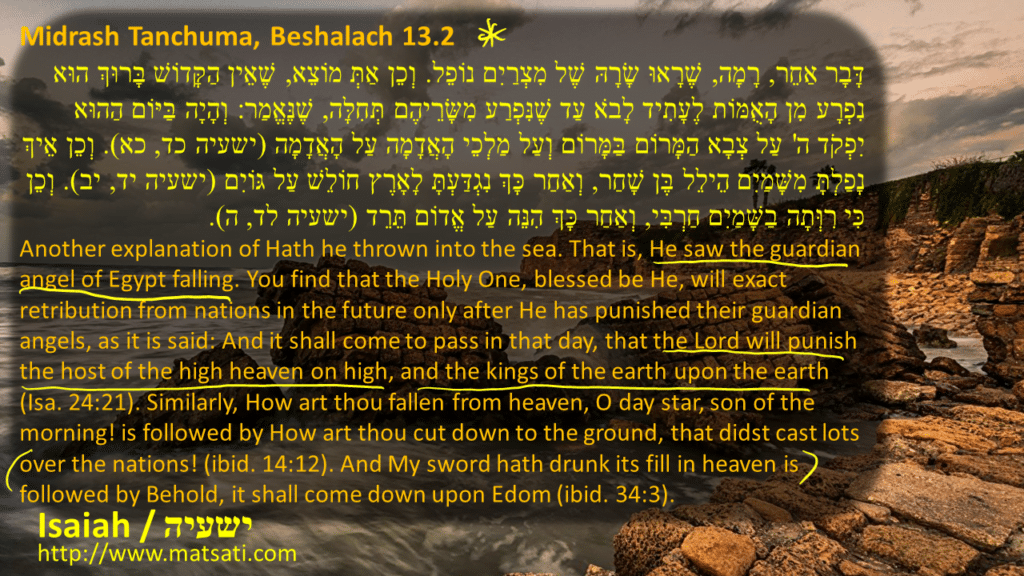
Midrash Tanchuma, Beshalach 13.2
דָּבָר אַחֵר, רָמָה, שֶׁרָאוּ שָׂרָהּ שֶׁל מִצְרַיִם נוֹפֵל. וְכֵן אַתְּ מוֹצֵא, שֶׁאֵין הַקָּדוֹשׁ בָּרוּךְ הוּא נִפְרָע מִן הָאֻמּוֹת לֶעָתִיד לָבֹא עַד שֶׁנִּפְרַע מִשָּׂרֵיהֶם תְּחִלָּה, שֶׁנֶּאֱמַר: וְהָיָה בַּיּוֹם הַהוּא יִפְקֹד ה’ עַל צְבָא הַמָּרוֹם בַּמָּרוֹם וְעַל מַלְכֵי הָאֲדָמָה עַל הָאֲדָמָה (ישעיה כד, כא). וְכֵן אֵיךְ נָפַלְתָּ מִשָּׁמַיִם הֵילֵל בֶּן שָׁחַר, וְאַחַר כָּךְ נִגְדַּעְתָּ לָאָרֶץ חוֹלֵשׁ עַל גּוֹיִם (ישעיה יד, יב). וְכֵן כִּי רִוְּתָה בַשָּׁמַיִם חַרְבִּי, וְאַחַר כָּךְ הִנֵּה עַל אֱדוֹם תֵּרֵד (ישעיה לד, ה).
Another explanation of Hath he thrown into the sea. That is, He saw the guardian angel of Egypt falling. You find that the Holy One, blessed be He, will exact retribution from nations in the future only after He has punished their guardian angels, as it is said: And it shall come to pass in that day, that the Lord will punish the host of the high heaven on high, and the kings of the earth upon the earth (Isa. 24:21). Similarly, How art thou fallen from heaven, O day star, son of the morning! is followed by How art thou cut down to the ground, that didst cast lots over the nations! (ibid. 14:12). And My sword hath drunk its fill in heaven is followed by Behold, it shall come down upon Edom (ibid. 34:3).
It is interesting here that the Midrash derives the idea that an evil spirit fell, specifically the guardian angel of Egypt. There appears to be a connection to the pride of the king and evil spirits. The rabbinic commentary states that first the guardian angel of a nation must be defeated before God’s wrath is poured out upon the people. The Midrash states “And it shall come to pass in that day, that the Lord will punish the host of the high heaven on high, and the kings of the earth upon the earth (Isa. 24:21).” This statement suggests that the punishment may occur at the same time. According to the Tanakh, Israel and the nations worshiped the host of heaven. The Torah states explicitly that Israel is not to worship the צְבָ֣א הַשָּׁמַ֔יִם (host of heaven, Devarim / Deuteronomy 4:19 and 17:3). Eventually however, there are a number of passages which show that Israel did exactly the opposite of this and worshiped the host of heaven. The צְבָ֣א הַשָּׁמַ֔יִם are mentioned in regard to the sins of the northern kingdom (2 Kings 17:16). In the southern kingdom Manasseh also practiced the worship of the host of heaven. (See 2 Kings 21:3-5, 2 Chronicles 33:3-5). Jeremiah alludes to the practice according to Jeremiah 8:2 and in 19:13 saying that such worship was performed on the roof tops (Zephaniah 1:5). Josiah attempted to stamp out the idolatrous worship in his day, among which was the burning of incense to all the hosts of heaven (2 Kings 23:4-5). This suggests a spiritual component and consequentially the host of heaven may also allude to the spiritual forces at work such as the Midrash is described as the guardian angel of these pagan nations. Rashi states the following concerning Isaiah 14.12.
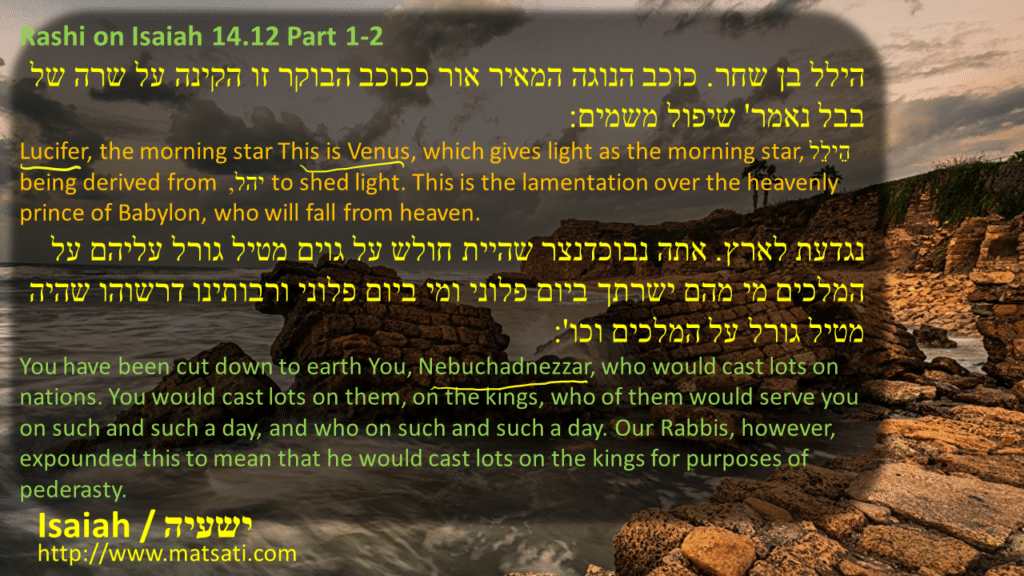
Rashi on Isaiah 14.12 Part 1-2
הילל בן שחר. כוכב הנוגה המאיר אור ככוכב הבוקר זו הקינה על שרה של בבל נאמר’ שיפול משמים:
Lucifer, the morning star This is Venus, which gives light as the morning star, הֵילֵל being derived from יהל, to shed light. This is the lamentation over the heavenly prince of Babylon, who will fall from heaven.
נגדעת לארץ. אתה נבוכדנצר שהיית חולש על גוים מטיל גורל עליהם על המלכים מי מהם ישרתך ביום פלוני ומי ביום פלוני ורבותינו דרשוהו שהיה מטיל גורל על המלכים וכו’:
You have been cut down to earth You, Nebuchadnezzar, who would cast lots on nations. You would cast lots on them, on the kings, who of them would serve you on such and such a day, and who on such and such a day. Our Rabbis, however, expounded this to mean that he would cast lots on the kings for purposes of pederasty.
Rashi fills in the gaps, Rashi speaks about the king of Babylon casting lots. This comes from the Talmud Bavli Shabbat 149b which discusses the word חֲלָשִׁים referring to the word חוֹלֵשׁ discussing how this is a term used in the mishna, ḥalashim, for lots (ספר ישעיה פרק יד, יב אֵיךְ נָפַלְתָּ מִשָּׁמַיִם הֵילֵל בֶּן-שָׁחַר נִגְדַּעְתָּ לָאָרֶץ חוֹלֵשׁ עַל-גּוֹיִם:). This is connected to casting lots to choose a king from a kingdom for sexual sin. In the rabbinic literature the act of sexual sin is always connected to idol worship. Notice how these things connect the worship of the host of heaven to pride and sexual sin. This speaks to the idea of pride causing one to believe that he is entitled to act however he wants and to do to others whatever he desires. This is the kind of attitude of the fallen one according to Isaiah 14:13, יג וְאַת אְמַרת בְלִיבָך לְרוּמָא אַסַק עֵיל מִן עַמֵיה דַאְלָהָא אְשַוֵי כוּרסֵי מַלכוּתִי וְאַתֵיב בְטוּר זְמַן בִסיָפֵי צִיפוּנָא׃ 14:13 And thou, thou hast said in thy heart, I will climb up the heavens; I will place the throne of my kingdom above the people of God, and I will sit upon the mountain of the solemn assembly upon the ends of the north; (TgJ) This one whose pride was so great, he proposed to even set himself up in the place of God in the heavens. This is a sure-fire way to be cast down, just as Isaiah was saying here according to Isaiah 14:12. Ibn Ezra has the following to say concerning Isaiah 14:13.
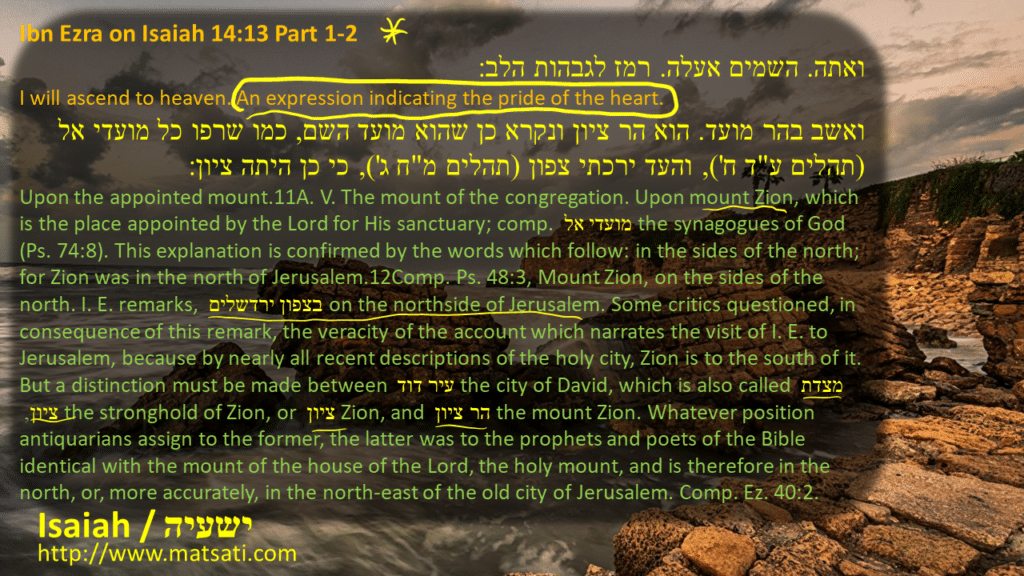
Ibn Ezra on Isaiah 14:13 Part 1-2
ואתה. השמים אעלה. רמז לגבהות הלב: I will ascend to heaven. An expression indicating the pride of the heart.
ואשב בהר מועד. הוא הר ציון ונקרא כן שהוא מועד השם, כמו שרפו כל מועדי אל (תהלים ע”ד ח’), והעד ירכתי צפון (תהלים מ”ח ג’), כי כן היתה ציון: Upon the appointed mount.11A. V. The mount of the congregation. Upon mount Zion, which is the place appointed by the Lord for His sanctuary; comp. מועדי אל the synagogues of God (Ps. 74:8). This explanation is confirmed by the words which follow: in the sides of the north; for Zion was in the north of Jerusalem.12Comp. Ps. 48:3, Mount Zion, on the sides of the north. I. E. remarks, בצפון ירדשלים on the northside of Jerusalem. Some critics questioned, in consequence of this remark, the veracity of the account which narrates the visit of I. E. to Jerusalem, because by nearly all recent descriptions of the holy city, Zion is to the south of it. But a distinction must be made between עיר דוד the city of David, which is also called מצדת ציון, the stronghold of Zion, or ציון Zion, and הר ציון the mount Zion. Whatever position antiquarians assign to the former, the latter was to the prophets and poets of the Bible identical with the mount of the house of the Lord, the holy mount, and is therefore in the north, or, more accurately, in the north-east of the old city of Jerusalem. Comp. Ez. 40:2.
Ibn Ezra says this claim to ascend to heaven is an issue of pride in the heart. This ascension is connected to going up the mountain of Zion, the place where the Lord has established His name forever, including his Mishkhan (Tabernacle / Sanctuary). There is some discussion on where exactly that location is, north, east, or south side? The conclusion is that it was on the north side of the city of David. The pride of this king states, יד אַסַק עִילָוֵי כָל עַמָא אֵיהֵי עִלַאי מִכוּלְהֹון׃ 14:14 I will have the ascendency over all people; I will be higher than all of them. (TgJ) The idea is that when the king declares through his pride that he will ascend above all people and be higher than them all, he is also declaring war against HaShem according to Akeidat Yitzchak 82:1 Part 2. The examples provided was David used the wealth granted him to fund the building of the temple. Haman used his wealth to obtain permission to wipe out the Jewish nation. Since the Jewish people had been given the prophet Moses, G’d had assigned Bileam to the nations of the world. The difference between the two lay in the fact that whereas Moses and other Jewish prophets warned their people against sin, Bileam seduced people into sinful behavior, causing them to forfeit their share in the world to come. Israel was to represent the compassion of God to not just their own people but to all of the world. (Jeremiah 48:36, Ezekiel 27:2). Bilam on the other hand sought the destruction of an entire nation who had not committed any offenses. The rabbis say this part of the Torah was given to reveal why God’s Holy Spirit was only given to His people and not to the Nations of the world. The point is that the Holy Spirit of God who indwells God’s faithful people is meant to help guide and direct us to live in love towards one another. It is interesting how Akeidat Yitzchak 53:1 Part 5 speaks of how Rashi comments when the people of Israel, Judah, and Jerusalem got to a state of no return, the Almighty gave Satan control over the Jewish people at that time. This is an interesting point as Judaism does teach the existence of the Evil One (Satan) and connects to the Torah portion Parashat Ki Tisa and the golden calf. The idea is that there was the assumption that the “gates of repentance” would remain open forever. This however is not the case as there is a point of no return, when one becomes so callous to sin that he or she does not repent from such. The example given is that “Jeroboam son of Nebat who had erected the golden calves on the way to Jerusalem in order to prevent the people from making their pilgrimages to the holy temple and had meant for these golden calves to act as substitutes. In the latter case, G-d’s retaliation was hundreds of years in coming, whereas Adam had been expelled from gan eden etc. immediately!”
Isaiah continues going on saying according to TgJ, טו בְרַם לִשאֹול תִיתַחַת לִסיָפֵי גוּב בֵית אַבדָנָא׃ 14:15 But to the grave thou shalt be brought down, to the ends of the pit of the place of perdition. טז חָזָך עְלָך יְדִיקוּן בָך יִסתַכְלוּן יֵימְרוּן הְדֵין גוּברָא אְזִיַע אַרעָא אַצדִי מַלכְווָתָא׃ 14:16 Those that see thee shall look attentively at thee, they shall consider thee, and say, Is this the man that made the earth to tremble, that laid waste kingdoms? יז שַוִי תֵבֵל כְמַדבְרָא וְקִרוֹוהִי פַגַר לַאְסִירֹוהִי לָא פְתַח תַרעָא׃ 14:17 That made the world as a wilderness, that laid waste its cities, and did not open the gate to his prisoners. יח כָל מַלכֵי עַמְמַיָא כוּלְהֹון שָכְבִין בִיקָר גְבַר בְבֵית עָלְמֵיה׃ 14:18 All the kings of the nations, all of them, lie down in glory, each in his eternal abode. יט וְאַת אִתרְכֵינתָא מִקִברָך כְיַחַט טְמִיר חַפִי קְטִילִין מְטָעְנֵי חְרַב נָחְתֵי לְגוּב בֵית אַבדָנָא כְפַגַר מְדַשדַש׃ 14:19 But thou art cast out of thy grave as a hidden abortion, as those hidden among the slain, as those pierced by the sword, as those that are descending the lowest pit of the place of destruction, as a carcase trodden under foot. כ לָא תְהֵי כְחַד מִינְהֹון בִקבוּרָא אְרֵי אַרעָך חַבֵילתָא עַמָך קַטֵילתָא לָא יִתקַייַם לְעָלַם זַרַע מַבאְשִין׃ 14:20 Thou shalt not be like one of them in burial; because thou hast destroyed thy country, thou hast slain thy people: the seed of evildoers shall not be established for ever. כא אַתקִינוּ לִבנֵיהֹון קְטֹול בְחֹובֵי אְבָהָתְהֹון דִלמָא יְקוּמוּן וְיַחסְנוּן אַרעָא וְיִמלֹון אַפֵי תֵבֵל בַעְלֵי דְבָב׃ 14:21 Prepare ye slaughter for his children, for the iniquity of their fathers; lest they rise and possess the earth, and the faces of the world be filled with enemies. (TgJ) The Midrash Tanchuma V’Zot HaBrakhah 6:1 has the following to say concerning Isaiah 14:15.
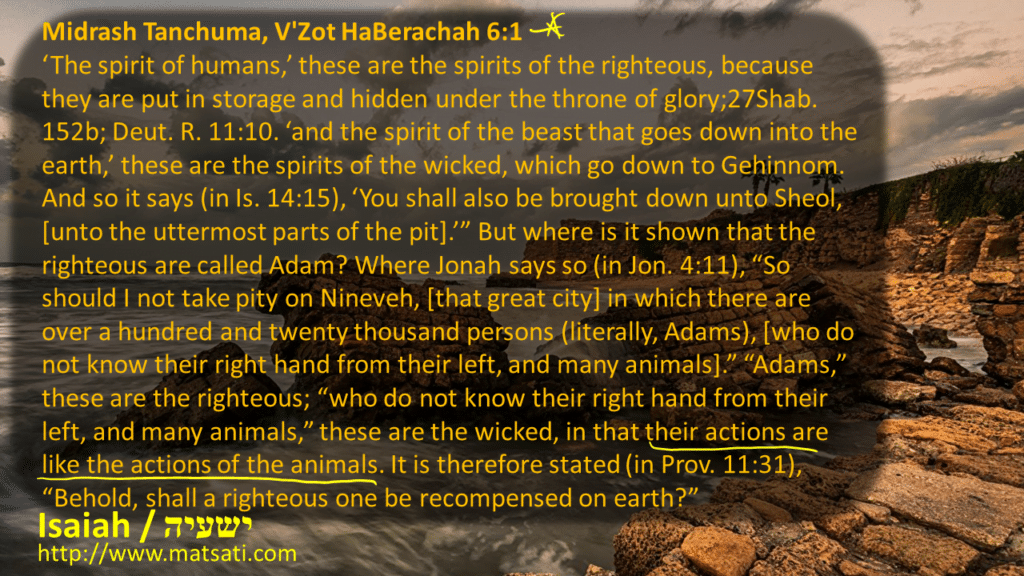
Midrash Tanchuma, V’Zot HaBerachah 6:1
‘The spirit of humans,’ these are the spirits of the righteous, because they are put in storage and hidden under the throne of glory;27Shab. 152b; Deut. R. 11:10. ‘and the spirit of the beast that goes down into the earth,’ these are the spirits of the wicked, which go down to Gehinnom. And so it says (in Is. 14:15), ‘You shall also be brought down unto Sheol, [unto the uttermost parts of the pit].’” But where is it shown that the righteous are called Adam? Where Jonah says so (in Jon. 4:11), “So should I not take pity on Nineveh, [that great city] in which there are over a hundred and twenty thousand persons (literally, Adams), [who do not know their right hand from their left, and many animals].” “Adams,” these are the righteous; “who do not know their right hand from their left, and many animals,” these are the wicked, in that their actions are like the actions of the animals. It is therefore stated (in Prov. 11:31), “Behold, shall a righteous one be recompensed on earth?”
It is interesting the Midrash draws out a parallel to Revelation 6:9-11.
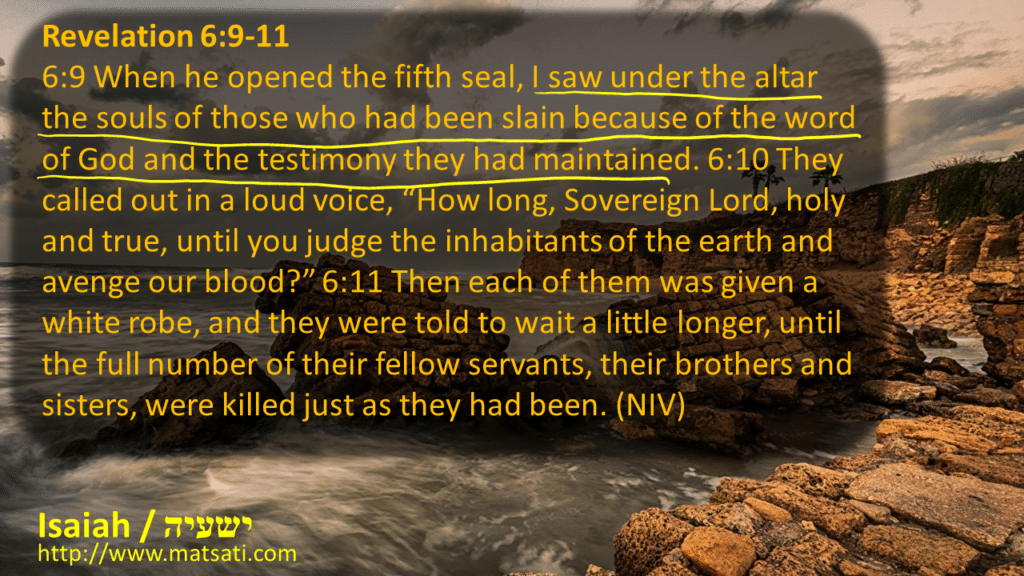
Revelation 6:9-11
6:9 When he opened the fifth seal, I saw under the altar the souls of those who had been slain because of the word of God and the testimony they had maintained. 6:10 They called out in a loud voice, “How long, Sovereign Lord, holy and true, until you judge the inhabitants of the earth and avenge our blood?” 6:11 Then each of them was given a white robe, and they were told to wait a little longer, until the full number of their fellow servants, their brothers and sisters, were killed just as they had been. (NIV)
We note how the spirits of the righteous are placed in storage and protected according to the Midrash, which is something very similar to what we read in Revelation 6:9-11. The spirits of the wicked are those who go down to Geninnom with the beast. Note the parallels to the book of Revelation which are being drawn out of Isaiah chapter 14. There is a point of significance that is connected to the righteous who do not know their right from their left. This is an interesting context as the left and the right represent unrighteousness and righteousness, respectively. The idea of not knowing left from right, seems to suggest the innocence of these whom the Talmud are referring to. Those who are innocent do not practice wickedness, and those who are not instructed in the Scriptures, also do not practice righteousness, but being innocent, the natural outcome is not sinning against a neighbor by having a generalized mutual respect for others. The animals are those who walk in the בשר (the flesh) and live like animals in wanton desires, sexual sin, idolatry, the love of money, they lived having the action of animals. As we can see there is a distinct parallel here which describes how the wicked will on this earth persecute and kill the righteous, those who seek God, His Messiah, and bear his testimonies. These are encouraging words from the book of Revelation, the Lord has us and keeps us and great is the reward for him who overcomes, as Yeshua said to the churches in Revelation 2-3, the gift of eternal life is given to him who stands strong in his faith until the end!
